- Home
- Ann M. Martin
Main Street #8: Special Delivery Page 7
Main Street #8: Special Delivery Read online
Page 7
She felt so fine, in fact, that she couldn’t help but notice that others were not quite fine. The altos, for example, seemed just the teeniest bit off-key. And Germaine Lasley, who was standing behind Ruby, kept saying “No Peeking” instead of “Topeka” when they sang the song about the railroads. Germaine had a loud, although lovely, voice, and Ruby found it disconcerting to hear “On the Atchison, No Peeking, and the Santa Fe!” bleating into her ears.
The chorus took a brief break after the fourth song. Ruby glanced at Lacey. “Did you hear the altos?” she whispered.
Lacey frowned. “I’m an alto,” she reminded her.
“Well, you weren’t flat,” said Ruby hastily.
“You thought the altos were flat?”
“Um,” said Ruby. And then she couldn’t help herself. She turned around and hissed to Germaine, “It’s To-pe-ka. Not No Peeking. To. Pe. Ka.”
“Sor-ry,” said Germaine.
“Some people just can’t take criticism,” Ruby whispered to Lacey.
Ms. Angelo raised her arm for attention then, and the members of the chorus as well as everyone in the audience fell silent.
Ruby realized that once again she didn’t know which song came next, so she kept her mouth closed for the first few notes. She was surprised to discover that her friends were singing “Boogie Woogie Bugle Boy.” Here would be not only her solo line but many others, since the kids were to take turns singing. It was a song full of solos. Ruby drew in her breath and then caught up. The kids sang the first verse as a group. Then suddenly Lacey was singing alone next to Ruby. Germaine had the next line, followed by a sixth-grade boy, and then a girl whose name Ruby could never remember. What on earth was it? Either Jenny or Jeanie, Ruby decided. Or possibly Penny.
Ruby was just thinking that perhaps the girl’s name was Janice when she realized the room was silent. The entire room. Not a single voice was to be heard. The song couldn’t be over, could it? Ruby hadn’t sung her solo line. Then she saw that Ms. Angelo was looking sternly in her direction. At the same time, she felt Lacey pinch her side. “It’s your turn!” whispered Lacey as loudly as she dared.
Ruby gasped. Then she opened her mouth and sang, “He’s in the army now, a-blowin’ reveille.” She paused, not sure where her part ended, and decided to continue. “He’s the boogie woogie —”
“Stop!” hissed Lacey.
And Ruby realized that Jordan Banks was singing, “He’s the boogie woogie bugle boy of Company B,” glaring fiercely at her as he did so.
Ruby’s face was flaming. She listened to the voices as they continued around her. She knew the song. She just wasn’t quite sure about the division of the lines for the solos. She did remember — and just in time — that she was to sing the entire last verse by herself. That was her main solo, the one she’d been looking forward to. It went off without a hitch.
The concert continued. Each time a new song began, Ruby had to wait a beat or two to find out what it was before she could join in. When the final line of “Sweet Slumber” hung in the air, Ms. Angelo turned to the audience, smiled, and said simply, “Thank you.”
The audience erupted into applause, but Ruby knew it wasn’t for her. She looked at her feet as she filed out of the room, and then she made a mad dash for Min.
“Min! Min!” she cried, and she ran into her grandmother’s arms. “Let’s go home right now!”
Min, Flora, and Mr. Pennington were still shrugging into their coats and edging out of their row of seats.
“I’m sorry you’re upset,” said Min, and tried to disengage herself from Ruby and button her coat at the same time.
But Ruby buried her face against Min’s coat, not so much for comfort but because she sensed that Ms. Angelo might be in search of her. She tugged at her grandmother. “Please, let’s just go.”
Mr. Pennington peeked at his watch and said, “We really should be on our way. The concert lasted a little longer than I expected.”
Flora refrained from saying, “Probably because Ruby took so long to start singing.” Instead, she slipped an arm around her sister’s shoulders.
Ruby, gripping Min’s coat, hustled out of the community center before Ms. Angelo could speak to her.
Willow Hamilton stood at the base of a circular staircase that wound from the third floor to the fourth floor. In the lobby, which now seemed very far below, the staircase was stunning, but even up here it was impressive, with a wide, highly polished mahogany banister and a lavender-and-green carpet held in place at the back of each step by a shiny brass rod. Lovely. Willow tipped her head back and looked up. How many more floors did this place have? she wondered.
Deer Lodge, it was called. When her father had first mentioned it to her and Cole, she had pictured a cabin in the woods, and probably not a cabin she would like much — one featuring the heads of slain animals on the walls, their fur as rugs on the floors, and displays of rifles and arrows and other instruments of torture. Hunting was wrong, senseless, useless, and cruel, and now her father was going to make her spend this Thanksgiving, which was already horrible, in a place called Deer Lodge.
Willow should have known better. She should have known that her father, wanting only to give her and her brother a pleasant break from the sadness in their lives, wouldn’t take them to a place with reminders of death in every room. And he hadn’t. Deer Lodge, commanding a striking view from its New England mountaintop, had turned out to be the grandest hotel Willow had ever seen. It was enormous and sprawling, and every inch was beautiful. Willow felt like a princess in a palace. Best of all, her father had said on that first morning, Thanksgiving morning, that she and Cole were free to explore the hotel on their own.
Leaving their father ensconced in an armchair in the lobby, with the newspaper and a cup of coffee at his elbow, Willow and Cole had set off, basking in their independence and also in the sense that around any corner they might stumble across a mystery. But almost immediately, they had discovered a game room, and Cole had settled in. “This is where I’m going to spend the morning,” he had announced. “Look at all these cool old games.”
Willow had tried not to look disappointed. “Couldn’t we explore just a little bit?” she had asked.
“Oh, you can go explore. I don’t mind.”
“But how are you going to play games all by yourself?”
“Well, I need to study some of them first,” Cole replied seriously. “I haven’t even heard of that one,” he said, pointing. “Or that one. And anyway, I’ll bet some other kids will come along and then I can play with them. Just tell Dad where I am, okay?”
“Okay,” Willow said, and realized that she was quite happy at the prospect of exploring on her own. All at once, it seemed like exactly the right kind of thing for this particular morning — a morning of promise and novelty and old secrets.
So Willow dashed back to the lobby and told her father that Cole was down the hall in the game room, and then with a great sense of purpose she climbed the circular staircase to the second floor. At the top she looked right and left along the corridor, which was carpeted in the same green and lavender as the stairs. Just rooms? she wondered. Did something other than plain old hotel rooms lie behind any of these doors? She turned left and wandered through the hallway, noticing that the floor creaked pleasingly beneath her feet. Was she in a castle? In an imposing hotel in London? Had she traveled back in time? Anything seemed possible.
Willow walked all the way to the end of the corridor and found that she could continue to the left — down another long corridor lined with doors. So far, she had seen nothing but room numbers on the doors and was just beginning to feel a bit disappointed when she came to a door that was open. She peeked inside and found a parlor overlooking a lawn, scrubby and brown in the November cold, that rolled away to a pine-dotted mountain slope. A sitting room, thought Willow. And she decided to sit and think. She chose an overstuffed floral chair facing the window. The arms and the back of the chair were draped with lace doilies th
e color of weak tea. Beside the chair, an ornate table held two books, a delicate lamp, and a pitcher. Willow looked in the pitcher. It was empty, but across the room a table with wheels held an immaculate silver tea service, and Willow wondered if a real afternoon tea might be served here later. She imagined herself sipping tea as, on the other side of the windows, shadows fell and the mountains dissolved in blackness.
Willow relaxed into the chair. She felt as far away from her old home, as far away from Camden Falls, as far away from her mother — as far away from her life — as she ever had, and she liked that. She wouldn’t say that living with her mother had been torture; that would be an exaggeration. But living with her mother had been difficult and confusing and sometimes very, very scary. Her mother was mentally ill. That much Willow understood. She didn’t, however, know exactly what was wrong with her mother and had recently decided that it didn’t matter. What mattered was that her mother was in the hospital again, and maybe this time she would truly get better. What mattered was that Willow and Cole could get on with their lives in a more normal fashion. What mattered was that Willow and Cole and their father could try to make their Row House into a real home.
Willow let out a sigh. After her mother had gone to the hospital, as horrible as that night had been, Willow had felt that instead of a hole in the family, her mother’s absence had at last made the family whole.
How awful that sounded. And yet, that was how Willow felt. Most of the time. But strangely not today. Today, Willow wished for her mother; she wished for a mom and a dad and a sister and a brother gathered around the table before their Thanksgiving dinner.
Willow recalled a conversation she had had with her father a week earlier. She had been sitting in the kitchen finishing her homework, Cole already asleep upstairs, and her father had turned on the fire under the teakettle and sat down across from her at the table.
“Everything going all right?” he had asked.
Willow had looked up from her French homework in surprise. “What?”
“Everything all right? Cole has been talking to me more than usual lately, asking questions, and you’ve become … not more quiet, exactly, but it’s been several days since you asked about your mother.”
Willow had allowed her eyes to stray to her homework again.
“Willow?”
She’d sighed and looked up. “I’m not asking questions because I know there aren’t any answers.”
“About what?”
“About anything to do with Mom. When will she come home? What will happen when she does come home? What will happen if it turns out that she hasn’t changed? Will we have to live with her rules again? I know there aren’t answers.”
Her father had reached across the table and rested his hand on hers. “There might be some answers,” he had said. “You will never have to live with the rules again. I promise. I’m not going to let that happen. The moment I see any sign of trouble, I’ll take care of it. Things aren’t going to be the way they were before.”
Willow wanted to believe that. She wanted to believe it more than anything. But she didn’t. Not any more than she believed she was a princess in a castle, or that she had traveled back in time to the year the hotel had been built.
She stared out at the pine trees. What had happened to her lovely morning? “I’m not going to let it get ruined,” she said aloud. She sat and thought some more, recalling the basket she and Cole and her father had found on their doorstep the day before as they were getting ready to leave on their trip. A secret basket. She had loved the surprise of it, loved that someone had thought of them. Cole had pounced on the chocolate, and her father had smiled a genuine smile as he placed the basket on their hall table.
Willow peered into the corridor. No one was in sight. She stepped into the creaky hallway again, and just like that was propelled back into her morning of discovery. Now she felt a bit like the heroine of an old movie she’d seen recently, Rebecca, wandering nervously through the halls of a mansion. She shivered deliciously at the preposterous thought of running into someone as hideous as the creepy Mrs. Danvers.
Willow walked and walked and poked her head through every open door she came across. She found a reading room, stocked with magazines, some of them ancient. She found a room where, apparently, small plays were performed. She found an actual ballroom and for a moment imagined herself twirling around the floor dressed in a gown, looking like Cinderella. And she found a library, which she decided was her favorite room in the entire hotel. It was on the fourth floor and was paneled in dark wood. The carpet was a deep red, and rolling ladders stood by the shelves, which were filled with row after row of books, most bound in leather. Willow let her hand trail along several of them. Jude the Obscure, A Tree Grows in Brooklyn, Pride and Prejudice, The Wind in the Willows, War and Peace. Willow Hamilton was in heaven.
Willow chose another chair facing out a window, this one with a view of a stand of birch trees, their bare branches scraping the sky, and plopped down into the cushions with a copy of Rebecca, which, to her surprise, she had also found. She had seen the movie and now she could read the book. She opened the cover, decided she liked the first sentence very much, but found the story slow going after that. Still, she persevered, curled tightly against the soft fabric of the wing chair, and willed herself not to think about Mrs. Danvers every time she heard a noise in the hallway.
Willow was still plodding through the story when, from a corner of the library, a clock chimed and suddenly she thought to look at her watch. She was supposed to meet Cole and her father in their room in just fifteen minutes in order to have time to dress for Thanksgiving dinner.
What a strange holiday this was, thought Willow. Thanksgiving in a hotel. Her family had never celebrated Thanksgiving anywhere other than in their own dining room. Still, she and Cole had been pleasantly surprised when they’d arrived at Deer Lodge the evening before to learn that the hotel offered a traditional dinner, from turkey to pumpkin pie, to be served at noon the next day.
“We’ll have to dress up,” their father had said. “No jeans or sneakers in the dining room. And coats and ties for the men.”
“I like that,” Willow had said. “It’s more festive.”
Now she left the library, after carefully replacing Rebecca in its spot on the shelf, and returned to their suite of rooms. She found her father and Cole already there, in the process of knotting their neckties. When Willow emerged from the bathroom a few minutes later, she was wearing a rippling black skirt, a white blouse, and a red vest.
“Very elegant,” commented her father approvingly. “We’ll be the best dressed family in the dining room.”
Downstairs, Willow watched the other hotel guests as they gathered in the lobby.
“This is exciting!” said Cole suddenly.
Willow could smell turkey and gravy and something sweet, probably the pumpkin pie, and she wanted to share her brother’s excitement but found herself instead feeling sorrow.
She missed her mother.
The doors to the dining hall opened then and the guests began to file inside. Willow stood on tiptoe and saw a sea of tables, each covered with a clean, almost sparkling, white cloth, a bowl of gourds and autumn leaves in the center, surrounded by orange candles that glowed softly in the room. It was beautiful, but it wasn’t home.
Willow searched the crowd of guests, looking for another family like hers. Why she hoped to find another girl missing her mother, she couldn’t have said, and she felt mean, but she continued to look. By now, a waiter had escorted the Hamiltons to their table, and Willow was still scanning the crowd when suddenly Cole pulled at his father’s jacket and reached up to whisper something in his ear.
“What was that?” asked Mr. Hamilton.
“That man is alone,” said Cole more loudly.
“What man?”
“That one,” Cole replied, trying not to point too conspicuously. “We should ask him to sit with us.”
Willow looked across t
he dining room and saw a thin, graying man, several years older than her father, she guessed, who was being shown to a table for one.
“Well, Cole —” Mr. Hamilton began to say.
“Please? Please can’t I ask him to come to our table?”
Mr. Hamilton glanced at Willow, who shrugged. Then she looked again at the man sitting motionlessly in the middle of the busy dining room, like a solitary rock in a stream, everything happening around him.
“I think we should invite him,” said Willow.
“Oh! I’ll do it! I’ll do it!” cried Cole, and he dashed away.
When he returned, he was holding the man’s hand. “This is Mr. Allen,” he said. “I told him we had never had Thanksgiving without our mother before and he said he had never had Thanksgiving without his wife before and that it’s nice to eat with a family.”
And that was how the Hamiltons met Mr. Allen, who became their good friend and who, years later when Willow got married, gave her a silver bowl that had been given to him and his wife on their wedding day and had brought them more happiness than they could have dreamed of.
Olivia Walter sat in the community center, surrounded by her parents, brothers, friends, and neighbors — and her jaw dropped.
Ruby Northrop had just made what even Olivia knew was a terrible mistake. Music was not Olivia’s specialty. She lived in a world of science — of facts and theories and principles and properties. She liked music, but she didn’t know it or understand it the way Ruby did, and she was confused when the hall became silent and the silence grew and grew like a balloon that threatened to explode. In that impossibly long moment, Olivia turned to her mother, then looked back at the members of the Children’s Chorus in time to see Lacey Morris glare at Ruby, and Ruby jump as if she had been poked, which, Olivia suspected, she had been.
At last, Ruby began to sing — alone — but after a line or two, she hesitated and then began to sing again at the same time that a boy began to sing, and now he was the one glaring at Ruby.

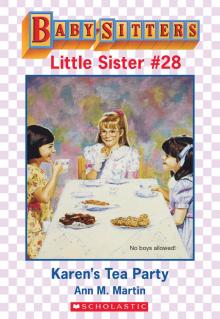 Karen's Tea Party
Karen's Tea Party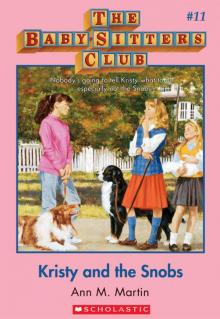 Kristy and the Snobs
Kristy and the Snobs Best Kept Secret
Best Kept Secret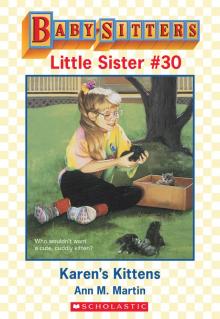 Karen's Kittens
Karen's Kittens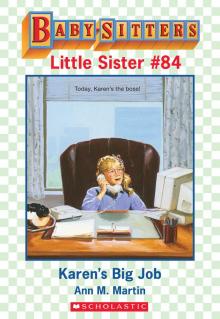 Karen's Big Job
Karen's Big Job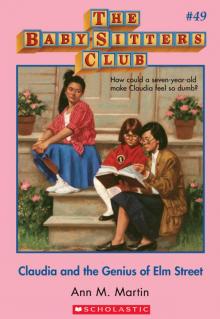 Claudia and the Genius of Elm Street
Claudia and the Genius of Elm Street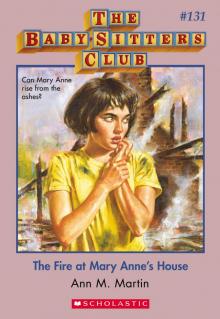 The Fire at Mary Anne's House
The Fire at Mary Anne's House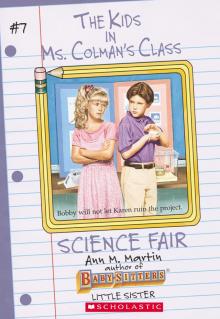 Science Fair
Science Fair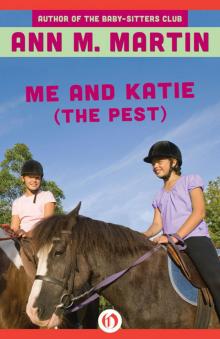 Me and Katie (The Pest)
Me and Katie (The Pest)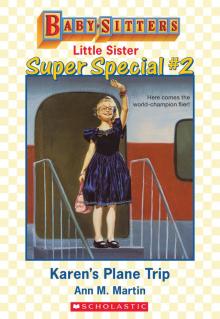 Karen's Plane Trip
Karen's Plane Trip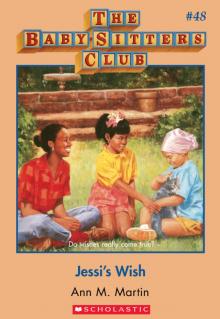 Jessi's Wish
Jessi's Wish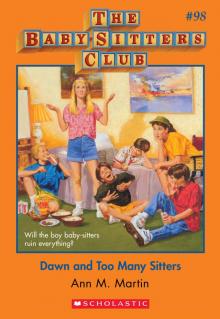 Dawn and Too Many Sitters
Dawn and Too Many Sitters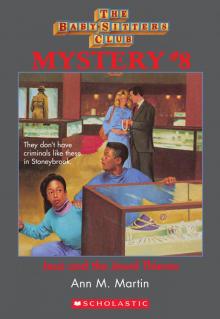 Jessi and the Jewel Thieves
Jessi and the Jewel Thieves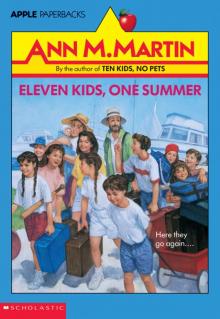 Eleven Kids, One Summer
Eleven Kids, One Summer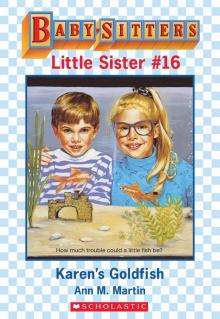 Karen's Goldfish
Karen's Goldfish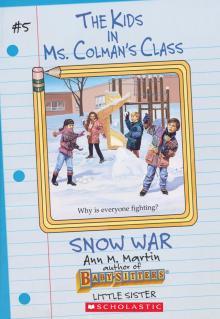 Snow War
Snow War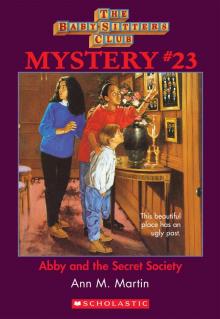 Abby and the Secret Society
Abby and the Secret Society Keeping Secrets
Keeping Secrets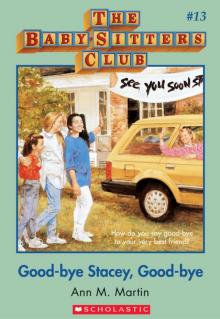 Good-Bye Stacey, Good-Bye
Good-Bye Stacey, Good-Bye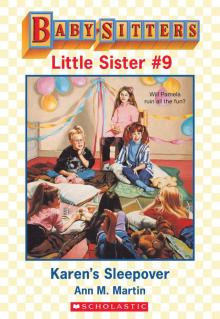 Karen's Sleepover
Karen's Sleepover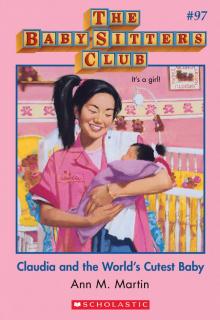 Claudia and the World's Cutest Baby
Claudia and the World's Cutest Baby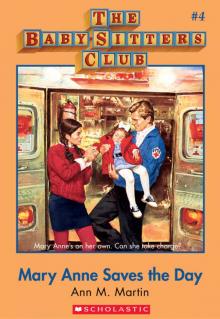 Mary Anne Saves the Day
Mary Anne Saves the Day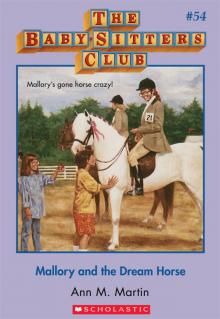 Mallory and the Dream Horse
Mallory and the Dream Horse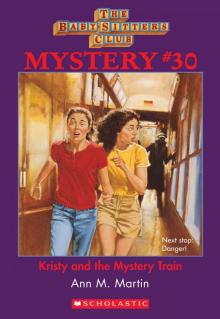 Kristy and the Mystery Train
Kristy and the Mystery Train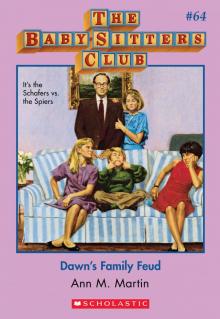 Dawn's Family Feud
Dawn's Family Feud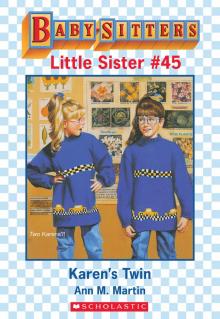 Karen's Twin
Karen's Twin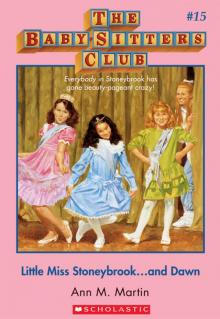 Little Miss Stoneybrook... And Dawn
Little Miss Stoneybrook... And Dawn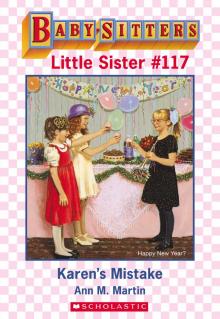 Karen's Mistake
Karen's Mistake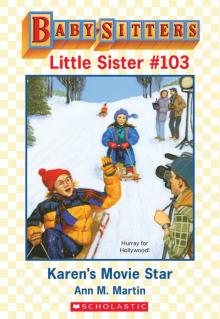 Karen's Movie Star
Karen's Movie Star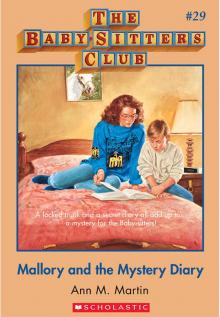 Mallory and the Mystery Diary
Mallory and the Mystery Diary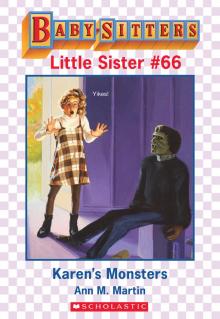 Karen's Monsters
Karen's Monsters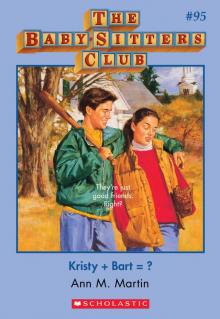 Kristy + Bart = ?
Kristy + Bart = ?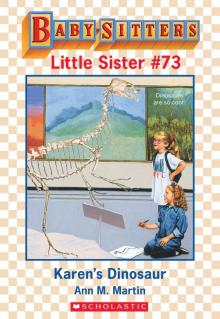 Karen's Dinosaur
Karen's Dinosaur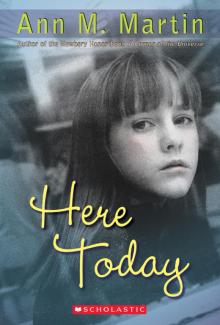 Here Today
Here Today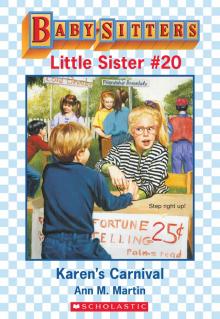 Karen's Carnival
Karen's Carnival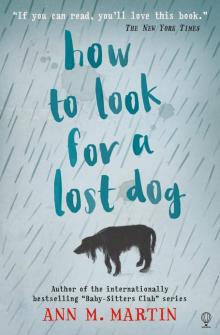 How to Look for a Lost Dog
How to Look for a Lost Dog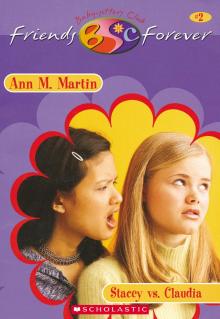 Stacey vs. Claudia
Stacey vs. Claudia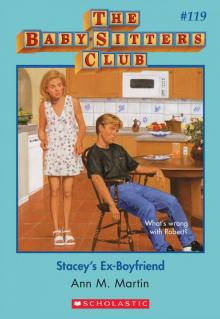 Stacey's Ex-Boyfriend
Stacey's Ex-Boyfriend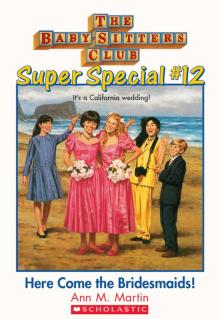 Here Come the Bridesmaids!
Here Come the Bridesmaids! Graduation Day
Graduation Day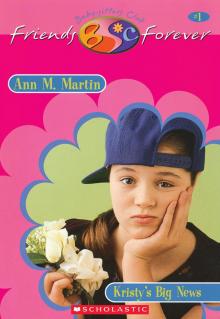 Kristy's Big News
Kristy's Big News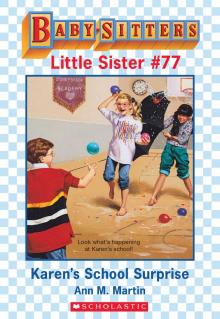 Karen's School Surprise
Karen's School Surprise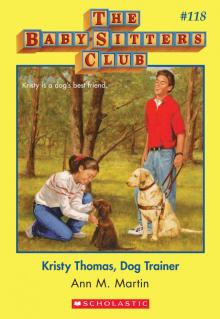 Kristy Thomas, Dog Trainer
Kristy Thomas, Dog Trainer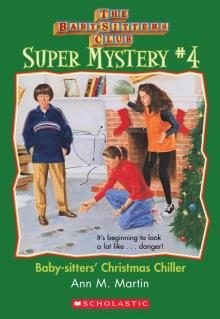 Baby-Sitters' Christmas Chiller
Baby-Sitters' Christmas Chiller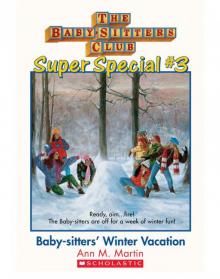 Baby-Sitters' Winter Vacation
Baby-Sitters' Winter Vacation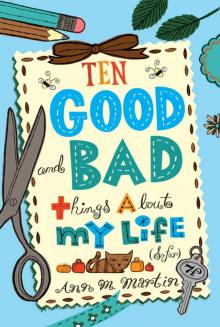 Ten Good and Bad Things About My Life
Ten Good and Bad Things About My Life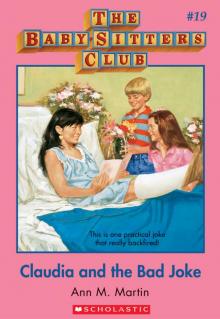 Claudia and the Bad Joke
Claudia and the Bad Joke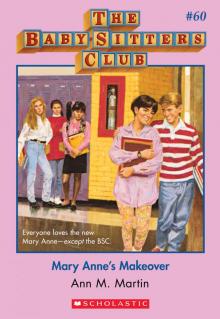 Mary Anne's Makeover
Mary Anne's Makeover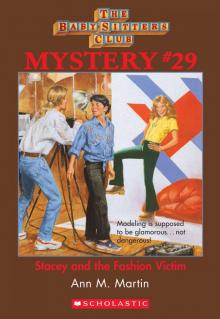 Stacey and the Fashion Victim
Stacey and the Fashion Victim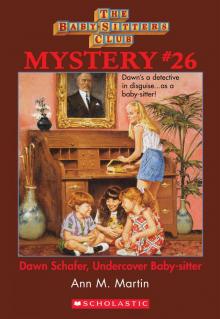 Dawn Schafer, Undercover Baby-Sitter
Dawn Schafer, Undercover Baby-Sitter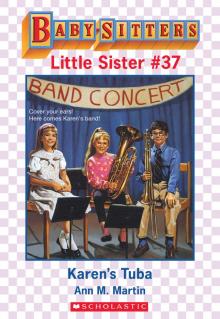 Karen's Tuba
Karen's Tuba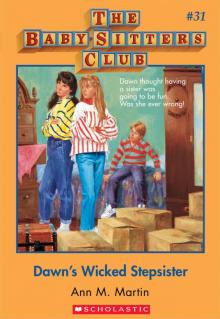 Dawn's Wicked Stepsister
Dawn's Wicked Stepsister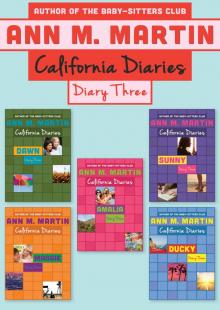 Diary Three: Dawn, Sunny, Maggie, Amalia, and Ducky
Diary Three: Dawn, Sunny, Maggie, Amalia, and Ducky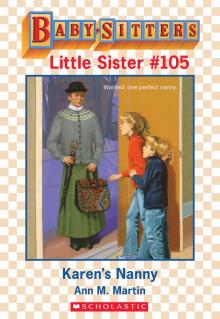 Karen's Nanny
Karen's Nanny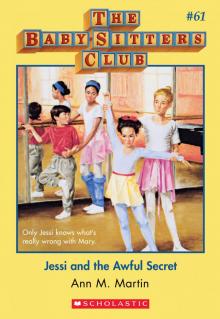 Jessi and the Awful Secret
Jessi and the Awful Secret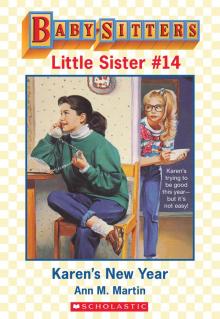 Karen's New Year
Karen's New Year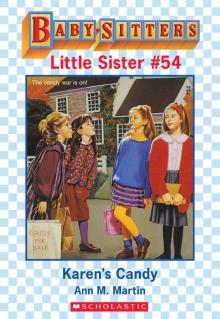 Karen's Candy
Karen's Candy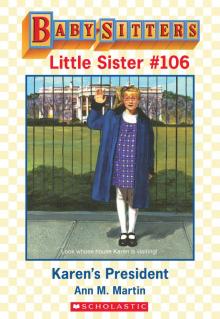 Karen's President
Karen's President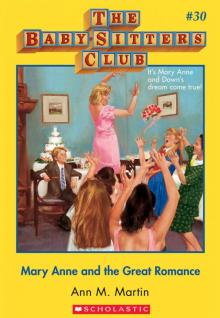 Mary Anne and the Great Romance
Mary Anne and the Great Romance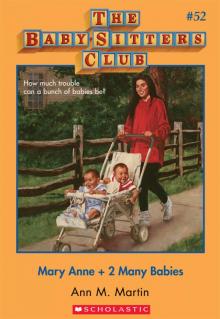 Mary Anne + 2 Many Babies
Mary Anne + 2 Many Babies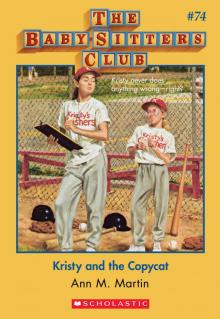 Kristy and the Copycat
Kristy and the Copycat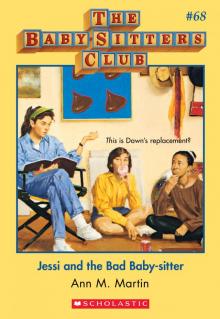 Jessi and the Bad Baby-Sitter
Jessi and the Bad Baby-Sitter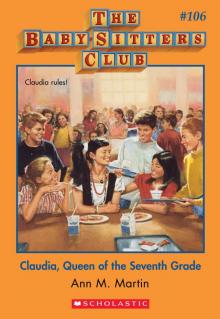 Claudia, Queen of the Seventh Grade
Claudia, Queen of the Seventh Grade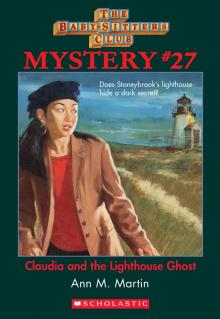 Claudia and the Lighthouse Ghost
Claudia and the Lighthouse Ghost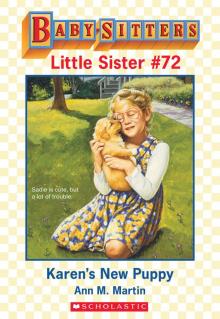 Karen's New Puppy
Karen's New Puppy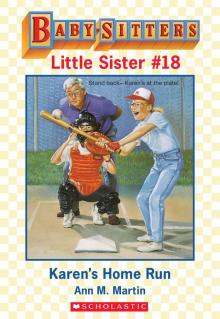 Karen's Home Run
Karen's Home Run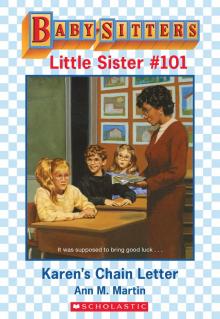 Karen's Chain Letter
Karen's Chain Letter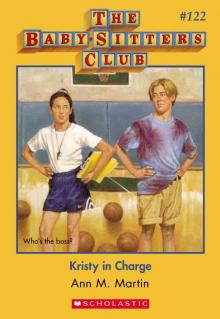 Kristy in Charge
Kristy in Charge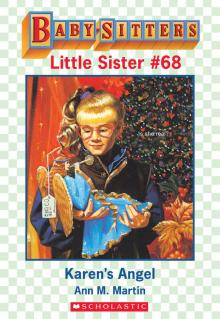 Karen's Angel
Karen's Angel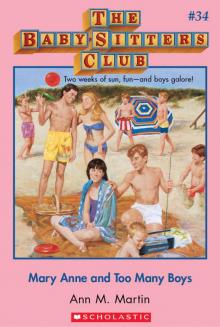 Mary Anne and Too Many Boys
Mary Anne and Too Many Boys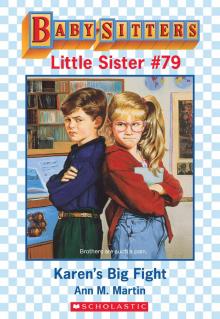 Karen's Big Fight
Karen's Big Fight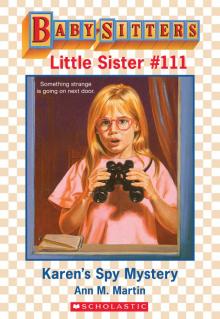 Karen's Spy Mystery
Karen's Spy Mystery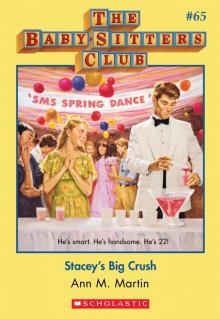 Stacey's Big Crush
Stacey's Big Crush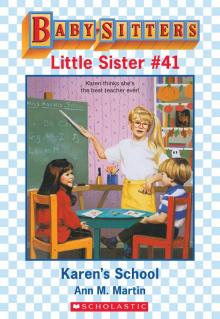 Karen's School
Karen's School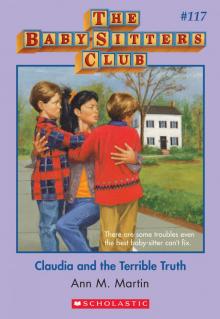 Claudia and the Terrible Truth
Claudia and the Terrible Truth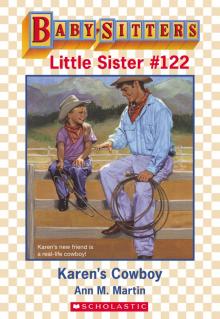 Karen's Cowboy
Karen's Cowboy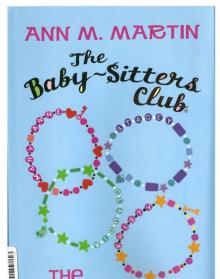 The Summer Before
The Summer Before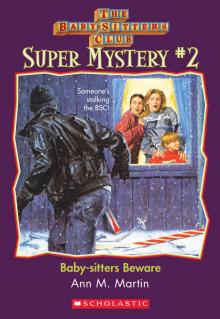 Beware, Dawn!
Beware, Dawn!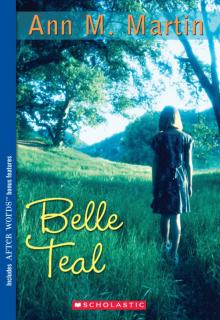 Belle Teale
Belle Teale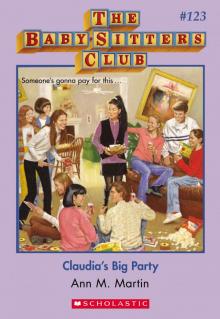 Claudia's Big Party
Claudia's Big Party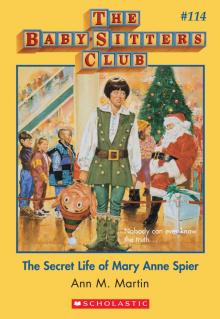 The Secret Life of Mary Anne Spier
The Secret Life of Mary Anne Spier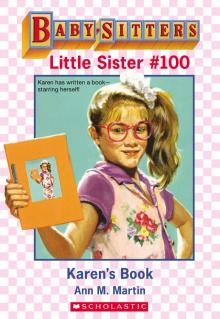 Karen's Book
Karen's Book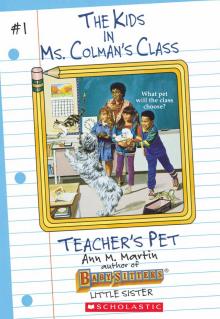 Teacher's Pet
Teacher's Pet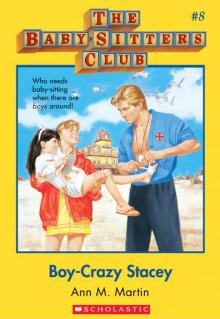 Boy-Crazy Stacey
Boy-Crazy Stacey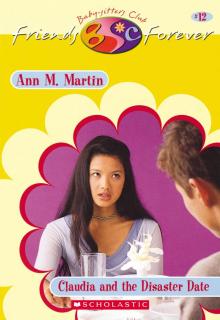 Claudia and the Disaster Date
Claudia and the Disaster Date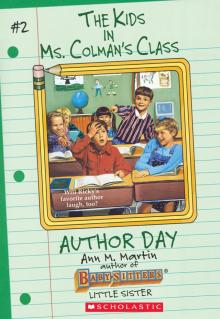 Author Day
Author Day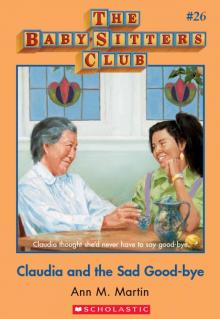 Claudia and the Sad Good-Bye
Claudia and the Sad Good-Bye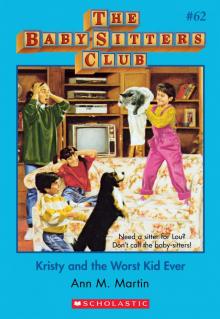 Kristy and the Worst Kid Ever
Kristy and the Worst Kid Ever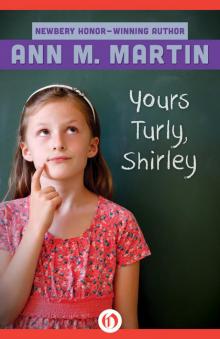 Yours Turly, Shirley
Yours Turly, Shirley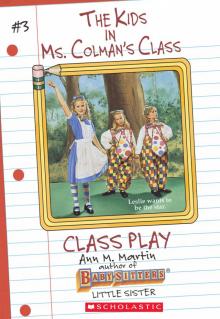 Class Play
Class Play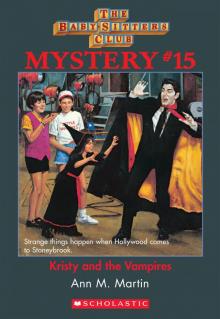 Kristy and the Vampires
Kristy and the Vampires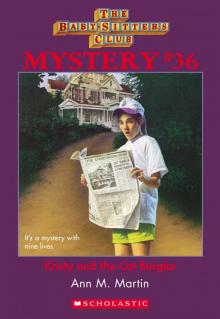 Kristy and the Cat Burglar
Kristy and the Cat Burglar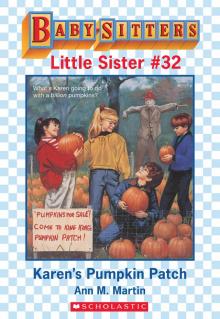 Karen's Pumpkin Patch
Karen's Pumpkin Patch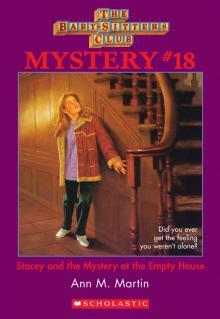 Stacey and the Mystery at the Empty House
Stacey and the Mystery at the Empty House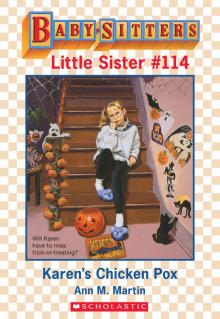 Karen's Chicken Pox
Karen's Chicken Pox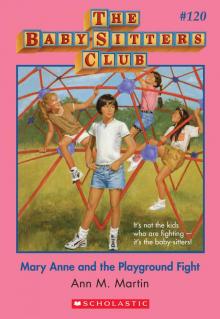 Mary Anne and the Playground Fight
Mary Anne and the Playground Fight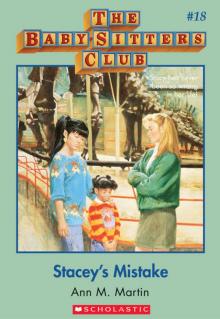 Stacey's Mistake
Stacey's Mistake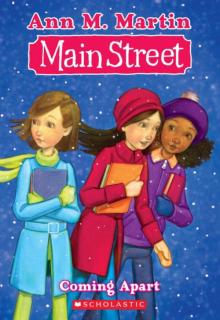 Coming Apart
Coming Apart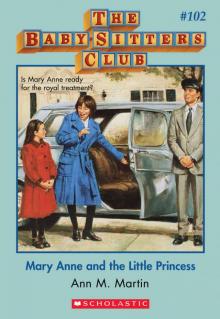 Mary Anne and the Little Princess
Mary Anne and the Little Princess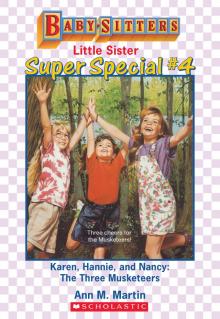 Karen, Hannie and Nancy: The Three Musketeers
Karen, Hannie and Nancy: The Three Musketeers 'Tis the Season
'Tis the Season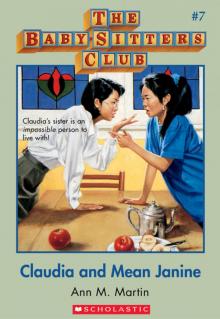 Claudia and Mean Janine
Claudia and Mean Janine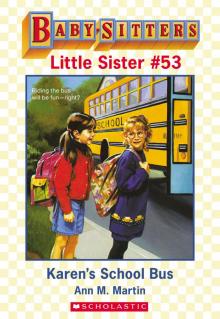 Karen's School Bus
Karen's School Bus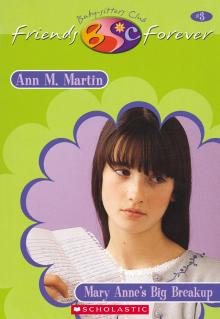 Mary Anne's Big Breakup
Mary Anne's Big Breakup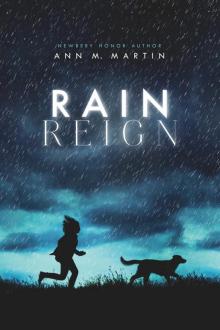 Rain Reign
Rain Reign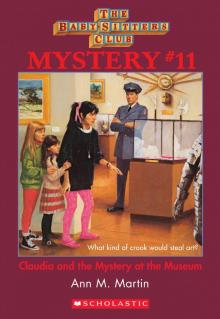 Claudia and the Mystery at the Museum
Claudia and the Mystery at the Museum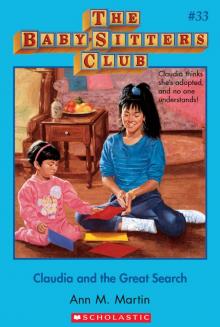 Claudia and the Great Search
Claudia and the Great Search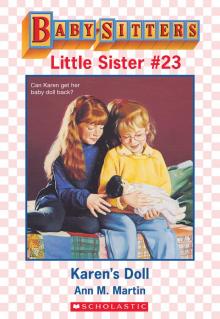 Karen's Doll
Karen's Doll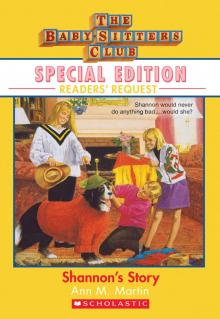 Shannon's Story
Shannon's Story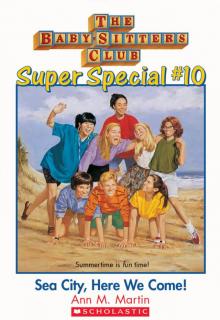 Sea City, Here We Come!
Sea City, Here We Come!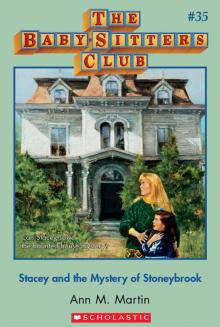 Stacey and the Mystery of Stoneybrook
Stacey and the Mystery of Stoneybrook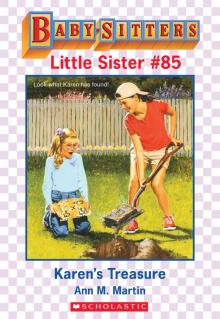 Karen's Treasure
Karen's Treasure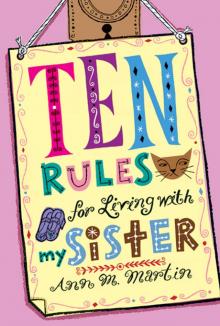 Ten Rules for Living With My Sister
Ten Rules for Living With My Sister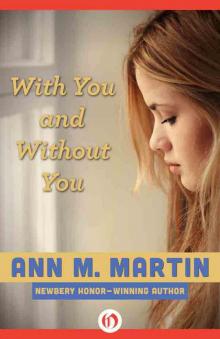 With You and Without You
With You and Without You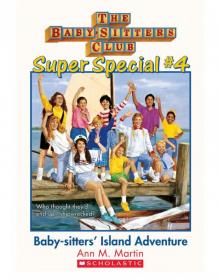 Baby-Sitters' Island Adventure
Baby-Sitters' Island Adventure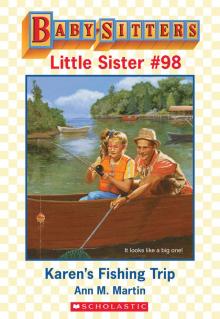 Karen's Fishing Trip
Karen's Fishing Trip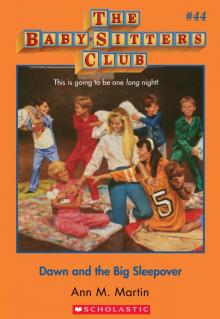 Dawn and the Big Sleepover
Dawn and the Big Sleepover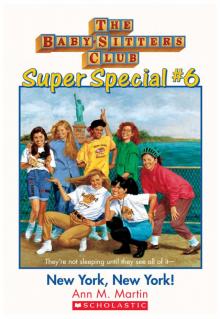 New York, New York!
New York, New York!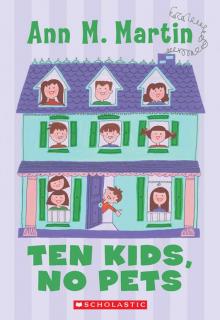 Ten Kids, No Pets
Ten Kids, No Pets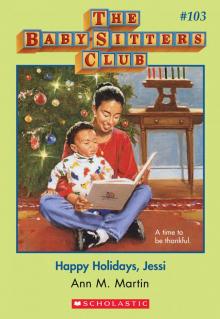 Happy Holidays, Jessi
Happy Holidays, Jessi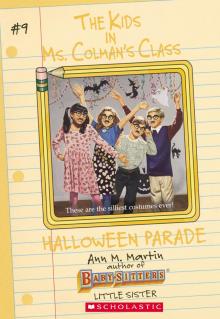 Halloween Parade
Halloween Parade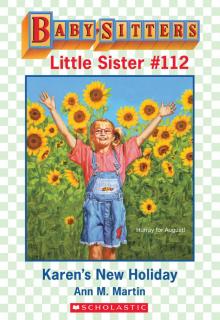 Karen's New Holiday
Karen's New Holiday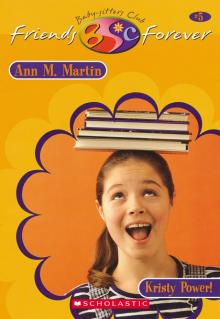 Kristy Power!
Kristy Power!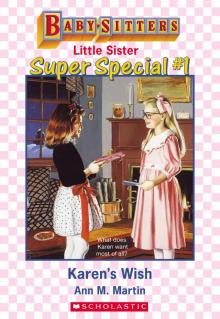 Karen's Wish
Karen's Wish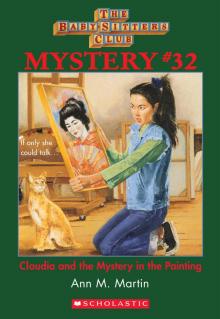 Claudia and the Mystery in the Painting
Claudia and the Mystery in the Painting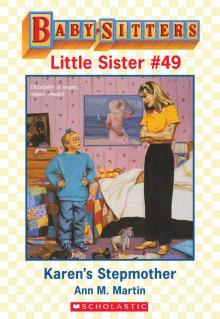 Karen's Stepmother
Karen's Stepmother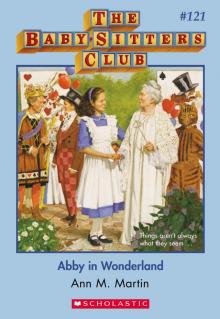 Abby in Wonderland
Abby in Wonderland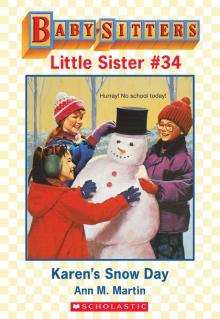 Karen's Snow Day
Karen's Snow Day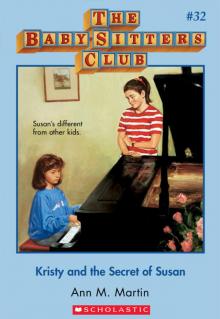 Kristy and the Secret of Susan
Kristy and the Secret of Susan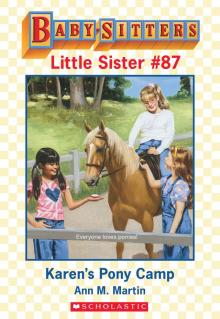 Karen's Pony Camp
Karen's Pony Camp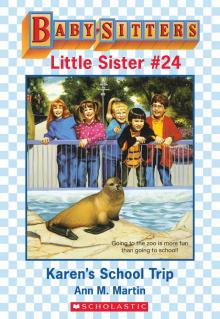 Karen's School Trip
Karen's School Trip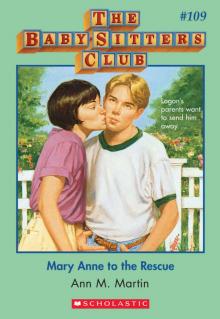 Mary Anne to the Rescue
Mary Anne to the Rescue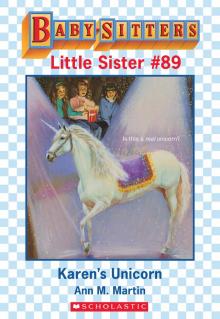 Karen's Unicorn
Karen's Unicorn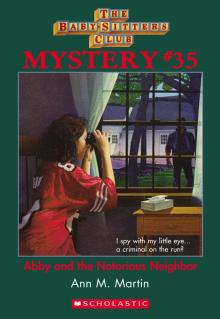 Abby and the Notorious Neighbor
Abby and the Notorious Neighbor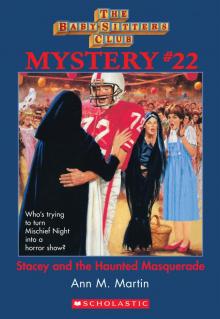 Stacey and the Haunted Masquerade
Stacey and the Haunted Masquerade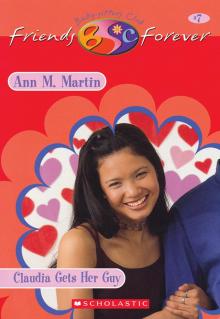 Claudia Gets Her Guy
Claudia Gets Her Guy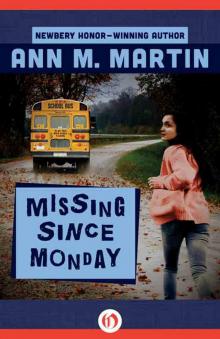 Missing Since Monday
Missing Since Monday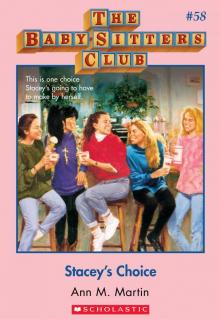 Stacey's Choice
Stacey's Choice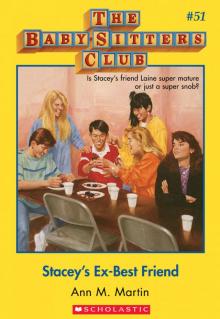 Stacey's Ex-Best Friend
Stacey's Ex-Best Friend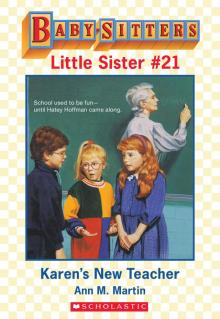 Karen's New Teacher
Karen's New Teacher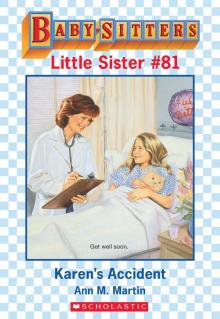 Karen's Accident
Karen's Accident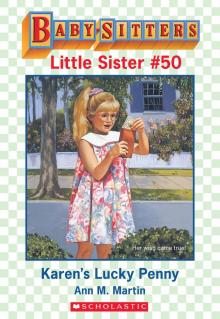 Karen's Lucky Penny
Karen's Lucky Penny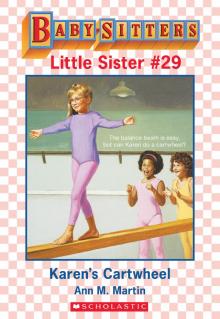 Karen's Cartwheel
Karen's Cartwheel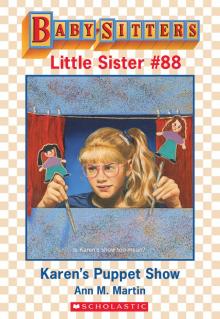 Karen's Puppet Show
Karen's Puppet Show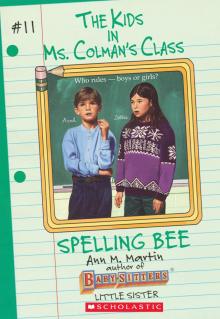 Spelling Bee
Spelling Bee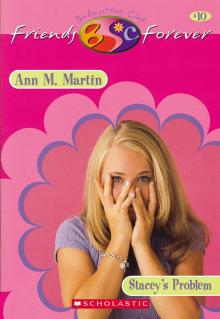 Stacey's Problem
Stacey's Problem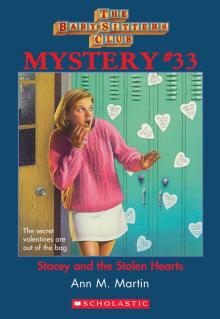 Stacey and the Stolen Hearts
Stacey and the Stolen Hearts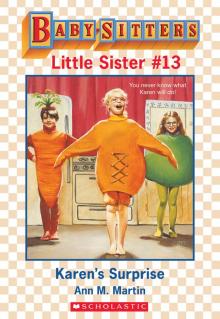 Karen's Surprise
Karen's Surprise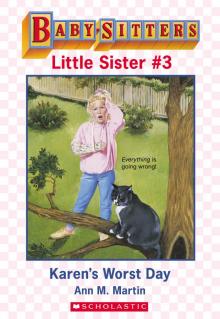 Karen's Worst Day
Karen's Worst Day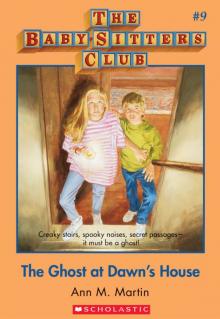 The Ghost at Dawn's House
The Ghost at Dawn's House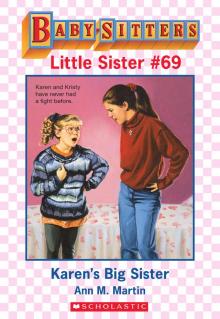 Karen's Big Sister
Karen's Big Sister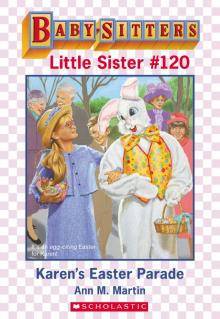 Karen's Easter Parade
Karen's Easter Parade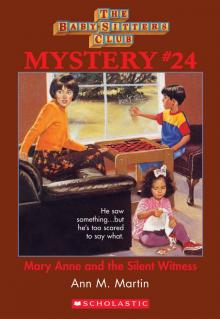 Mary Anne and the Silent Witness
Mary Anne and the Silent Witness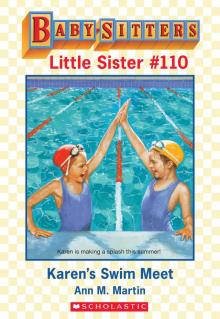 Karen's Swim Meet
Karen's Swim Meet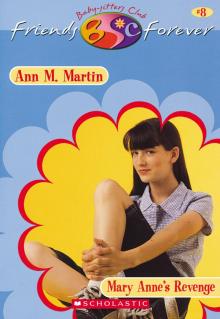 Mary Anne's Revenge
Mary Anne's Revenge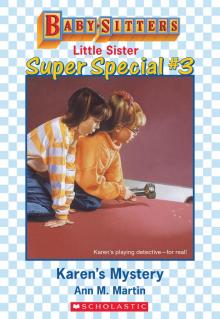 Karen's Mystery
Karen's Mystery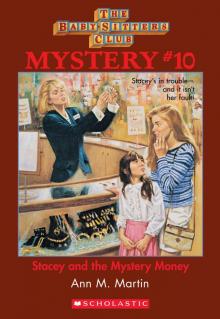 Stacey and the Mystery Money
Stacey and the Mystery Money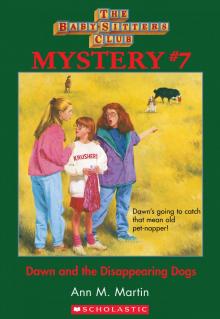 Dawn and the Disappearing Dogs
Dawn and the Disappearing Dogs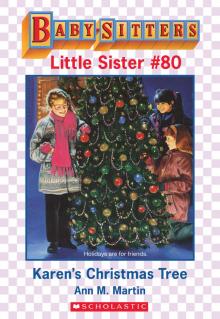 Karen's Christmas Tree
Karen's Christmas Tree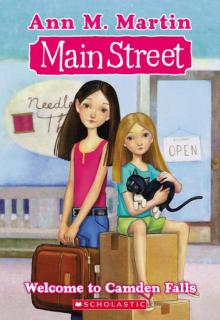 Welcome to Camden Falls
Welcome to Camden Falls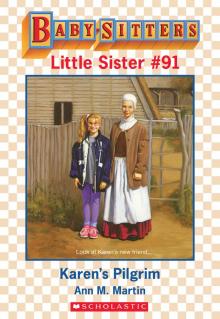 Karen's Pilgrim
Karen's Pilgrim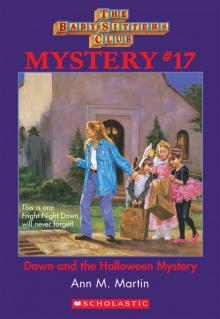 Dawn and the Halloween Mystery
Dawn and the Halloween Mystery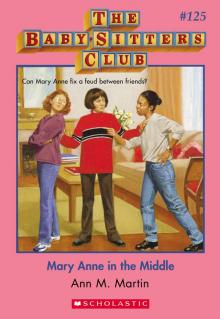 Mary Anne in the Middle
Mary Anne in the Middle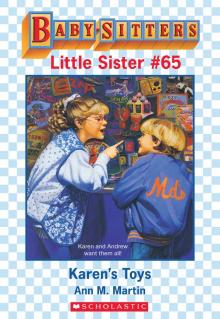 Karen's Toys
Karen's Toys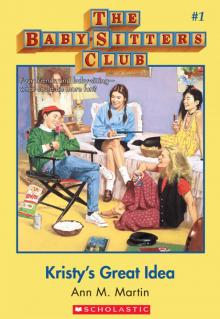 Kristy's Great Idea
Kristy's Great Idea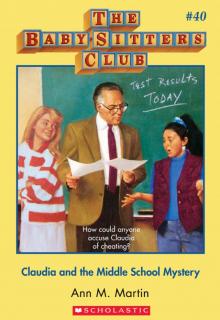 Claudia and the Middle School Mystery
Claudia and the Middle School Mystery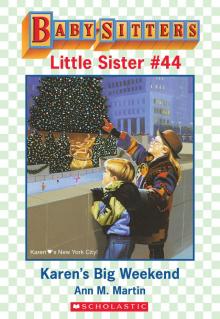 Karen's Big Weekend
Karen's Big Weekend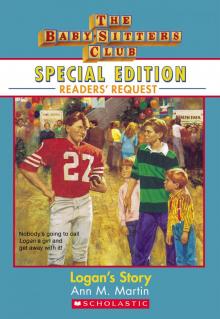 Logan's Story
Logan's Story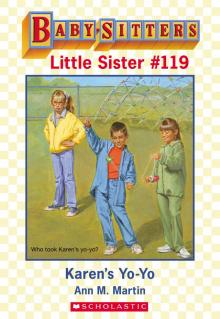 Karen's Yo-Yo
Karen's Yo-Yo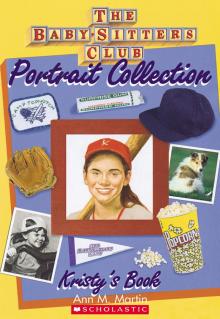 Kristy's Book
Kristy's Book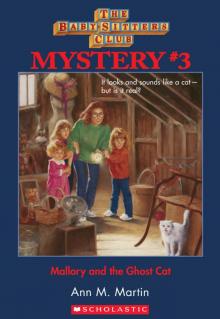 Mallory and the Ghost Cat
Mallory and the Ghost Cat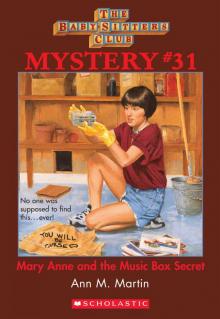 Mary Anne and the Music
Mary Anne and the Music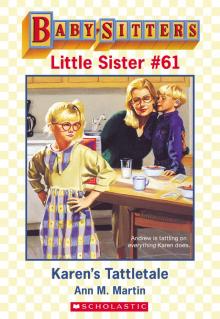 Karen's Tattletale
Karen's Tattletale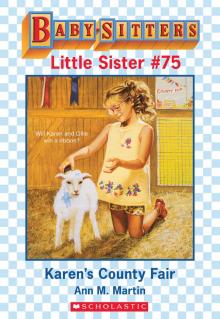 Karen's County Fair
Karen's County Fair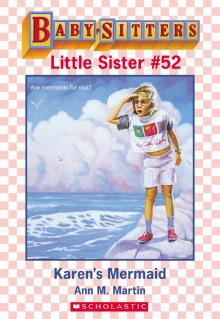 Karen's Mermaid
Karen's Mermaid Snowbound
Snowbound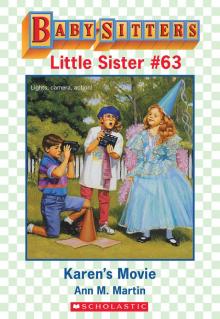 Karen's Movie
Karen's Movie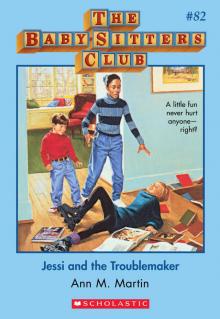 Jessi and the Troublemaker
Jessi and the Troublemaker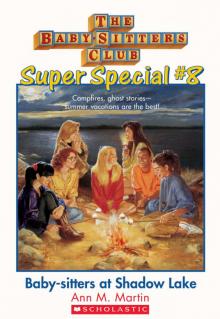 Baby-Sitters at Shadow Lake
Baby-Sitters at Shadow Lake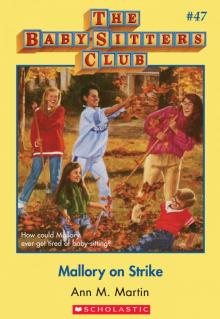 Mallory on Strike
Mallory on Strike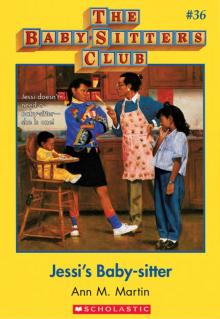 Jessi's Baby-Sitter
Jessi's Baby-Sitter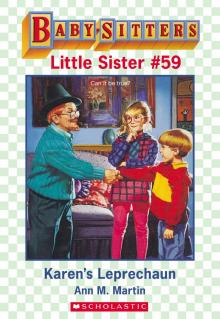 Karen's Leprechaun
Karen's Leprechaun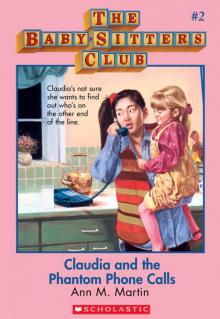 Claudia and the Phantom Phone Calls
Claudia and the Phantom Phone Calls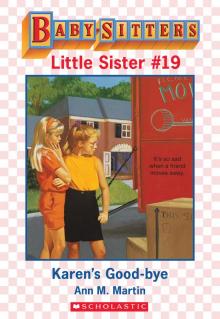 Karen's Good-Bye
Karen's Good-Bye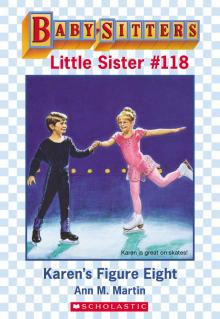 Karen's Figure Eight
Karen's Figure Eight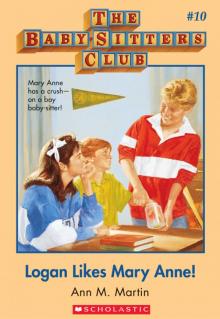 Logan Likes Mary Anne!
Logan Likes Mary Anne!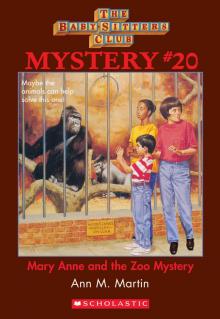 Mary Anne and the Zoo Mystery
Mary Anne and the Zoo Mystery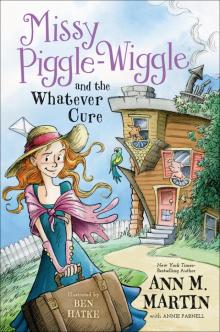 Missy Piggle-Wiggle and the Whatever Cure
Missy Piggle-Wiggle and the Whatever Cure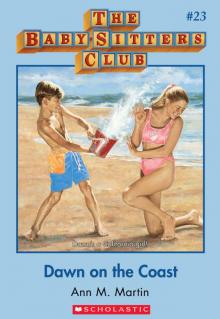 Dawn on the Coast
Dawn on the Coast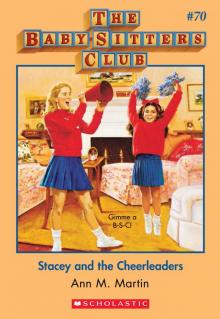 Stacey and the Cheerleaders
Stacey and the Cheerleaders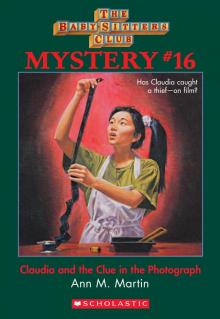 Claudia and the Clue in the Photograph
Claudia and the Clue in the Photograph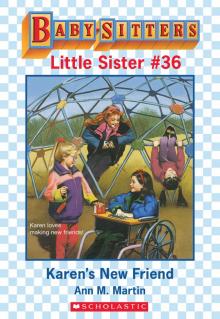 Karen's New Friend
Karen's New Friend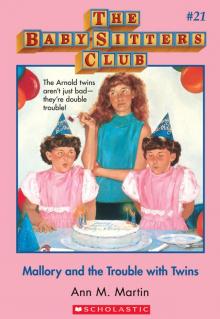 Mallory and the Trouble With Twins
Mallory and the Trouble With Twins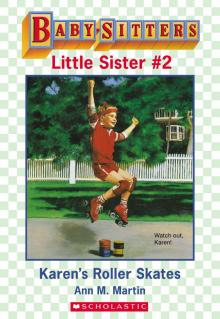 Karen's Roller Skates
Karen's Roller Skates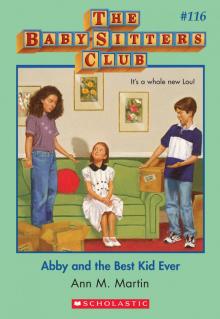 Abby and the Best Kid Ever
Abby and the Best Kid Ever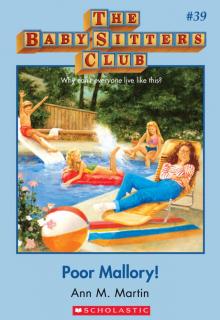 Poor Mallory!
Poor Mallory!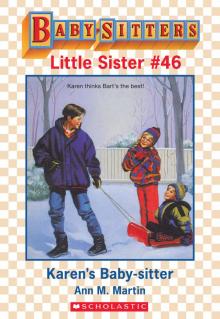 Karen's Witch
Karen's Witch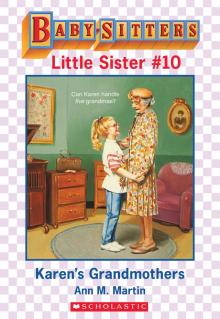 Karen's Grandmothers
Karen's Grandmothers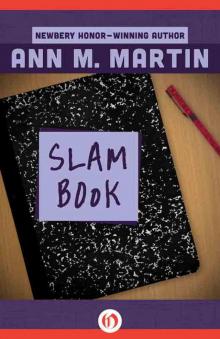 Slam Book
Slam Book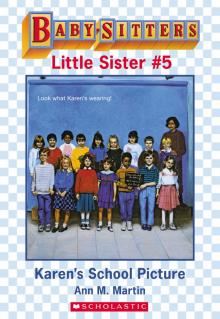 Karen's School Picture
Karen's School Picture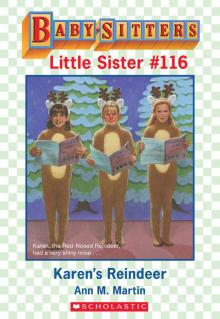 Karen's Reindeer
Karen's Reindeer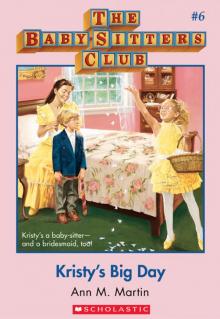 Kristy's Big Day
Kristy's Big Day The Long Way Home
The Long Way Home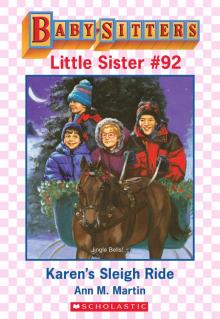 Karen's Sleigh Ride
Karen's Sleigh Ride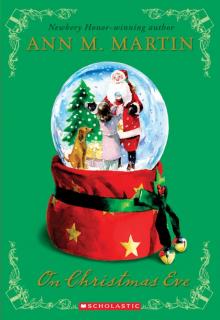 On Christmas Eve
On Christmas Eve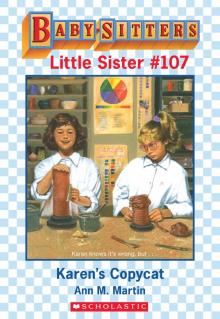 Karen's Copycat
Karen's Copycat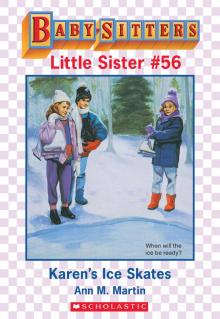 Karen's Ice Skates
Karen's Ice Skates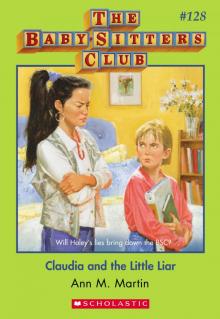 Claudia and the Little Liar
Claudia and the Little Liar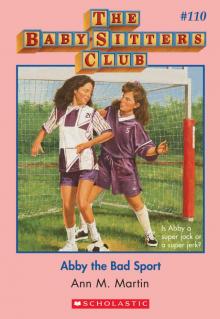 Abby the Bad Sport
Abby the Bad Sport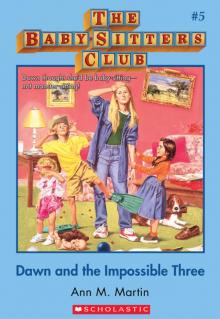 The Baby-Sitters Club #5: Dawn and the Impossible Three
The Baby-Sitters Club #5: Dawn and the Impossible Three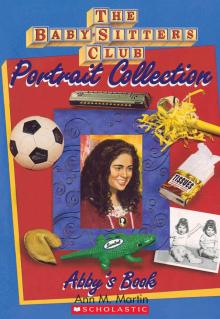 Abby's Book
Abby's Book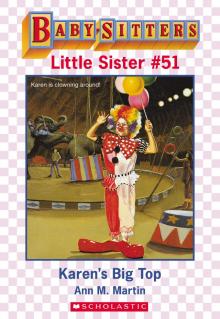 Karen's Big Top
Karen's Big Top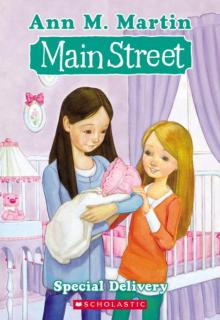 Main Street #8: Special Delivery
Main Street #8: Special Delivery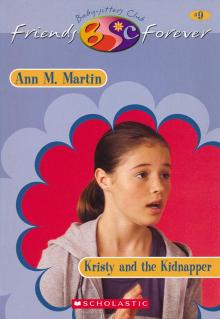 Kristy and the Kidnapper
Kristy and the Kidnapper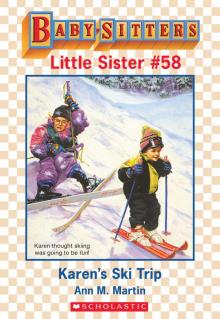 Karen's Ski Trip
Karen's Ski Trip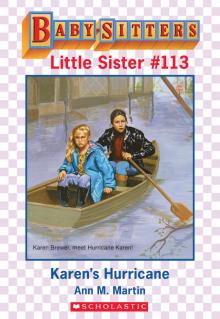 Karen's Hurricane
Karen's Hurricane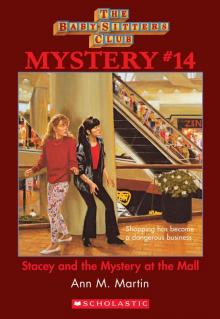 Stacey and the Mystery at the Mall
Stacey and the Mystery at the Mall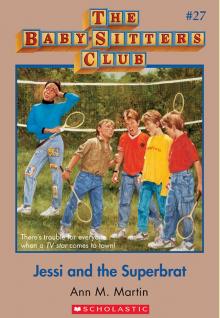 Jessi and the Superbrat
Jessi and the Superbrat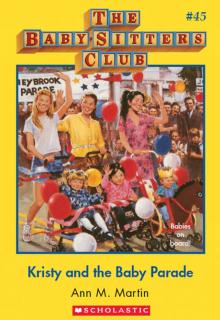 Kristy and the Baby Parade
Kristy and the Baby Parade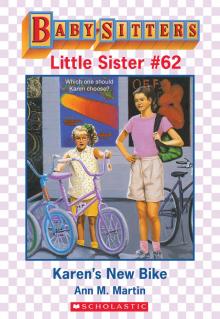 Karen's New Bike
Karen's New Bike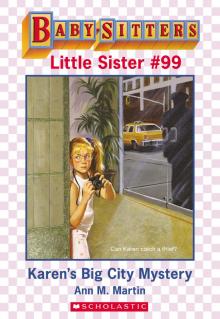 Karen's Big City Mystery
Karen's Big City Mystery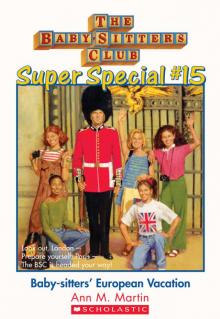 Baby-Sitters' European Vacation
Baby-Sitters' European Vacation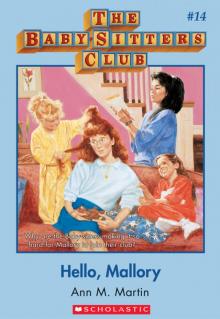 Hello, Mallory
Hello, Mallory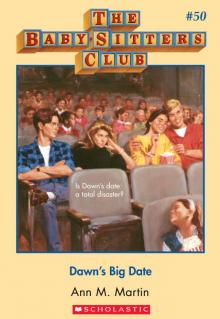 Dawn's Big Date
Dawn's Big Date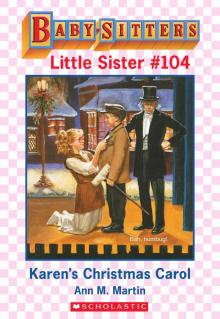 Karen's Christmas Carol
Karen's Christmas Carol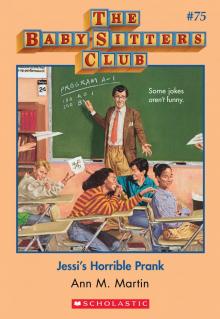 Jessi's Horrible Prank
Jessi's Horrible Prank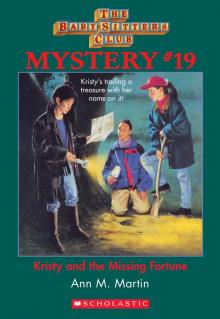 Kristy and the Missing Fortune
Kristy and the Missing Fortune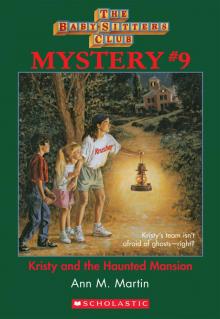 Kristy and the Haunted Mansion
Kristy and the Haunted Mansion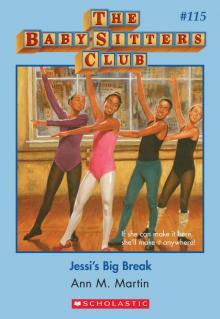 Jessi's Big Break
Jessi's Big Break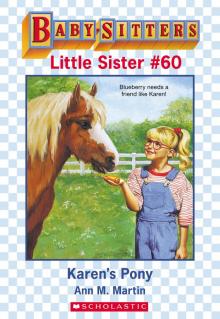 Karen's Pony
Karen's Pony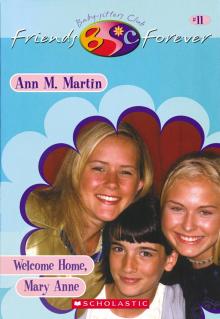 Welcome Home, Mary Anne
Welcome Home, Mary Anne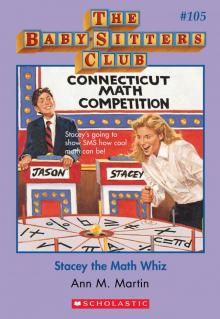 Stacey the Math Whiz
Stacey the Math Whiz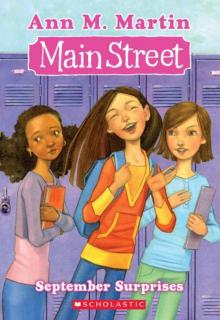 September Surprises
September Surprises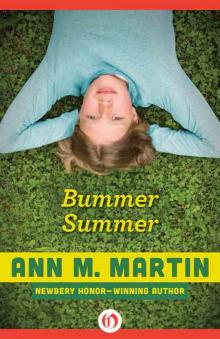 Bummer Summer
Bummer Summer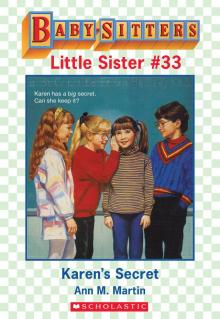 Karen's Secret
Karen's Secret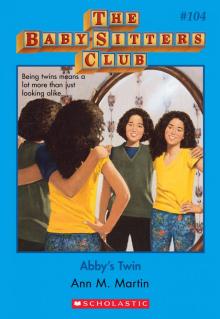 Abby's Twin
Abby's Twin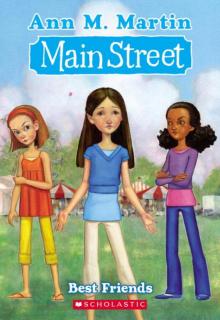 Main Street #4: Best Friends
Main Street #4: Best Friends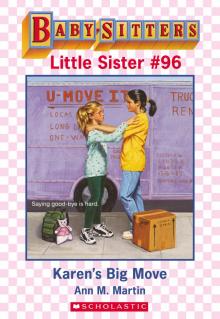 Karen's Big Move
Karen's Big Move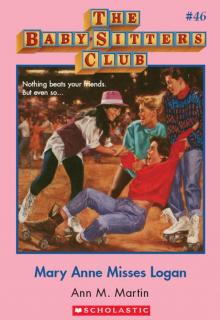 Mary Anne Misses Logan
Mary Anne Misses Logan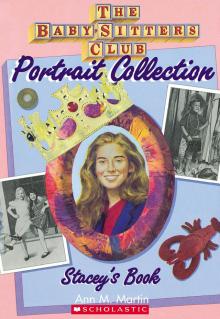 Stacey's Book
Stacey's Book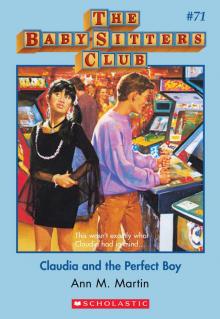 Claudia and the Perfect Boy
Claudia and the Perfect Boy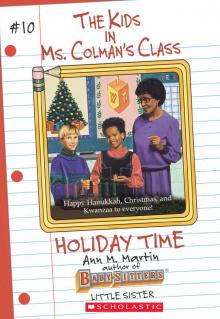 Holiday Time
Holiday Time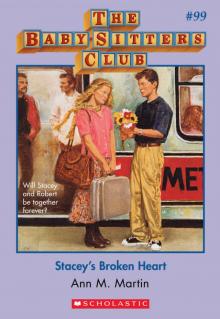 Stacey's Broken Heart
Stacey's Broken Heart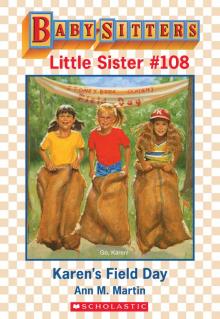 Karen's Field Day
Karen's Field Day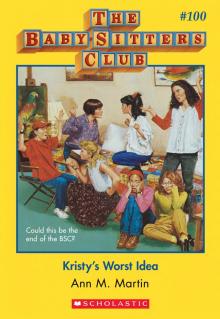 Kristy's Worst Idea
Kristy's Worst Idea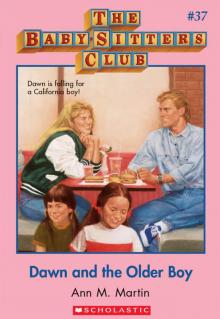 Dawn and the Older Boy
Dawn and the Older Boy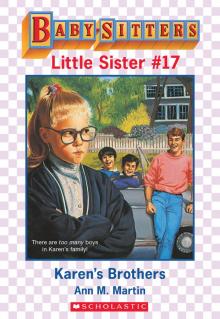 Karen's Brothers
Karen's Brothers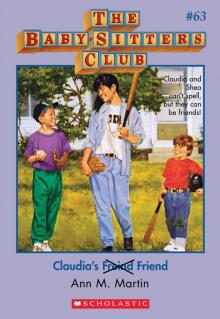 Claudia's Friend
Claudia's Friend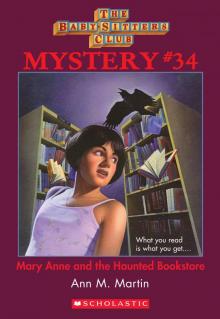 Mary Anne and the Haunted Bookstore
Mary Anne and the Haunted Bookstore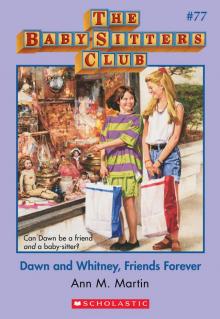 Dawn and Whitney, Friends Forever
Dawn and Whitney, Friends Forever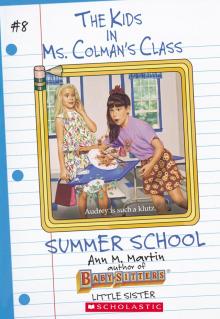 Summer School
Summer School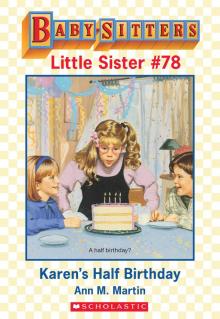 Karen's Birthday
Karen's Birthday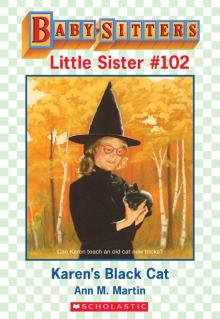 Karen's Black Cat
Karen's Black Cat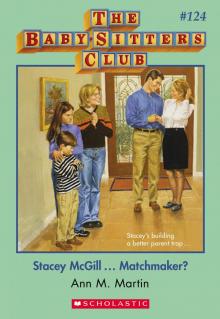 Stacey McGill... Matchmaker?
Stacey McGill... Matchmaker?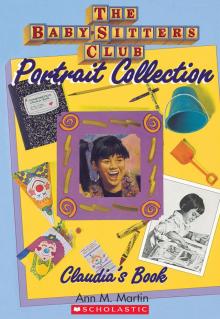 Claudia's Book
Claudia's Book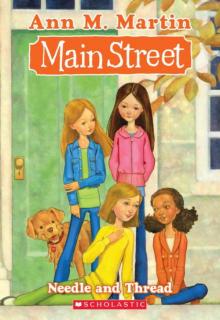 Main Street #2: Needle and Thread
Main Street #2: Needle and Thread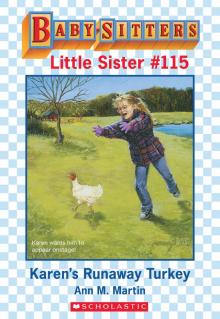 Karen's Runaway Turkey
Karen's Runaway Turkey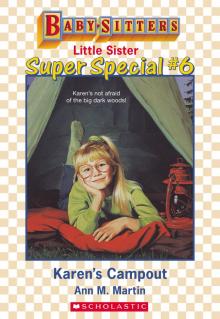 Karen's Campout
Karen's Campout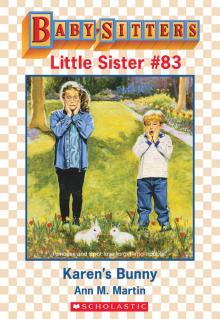 Karen's Bunny
Karen's Bunny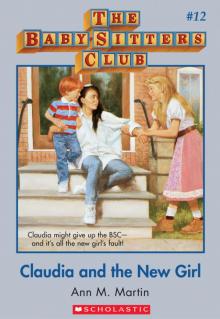 Claudia and the New Girl
Claudia and the New Girl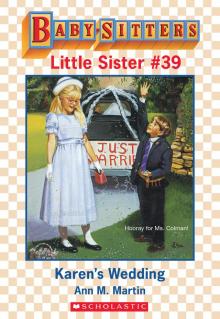 Karen's Wedding
Karen's Wedding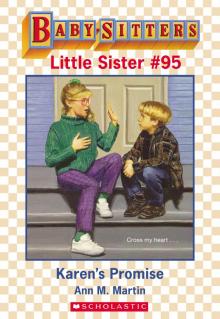 Karen's Promise
Karen's Promise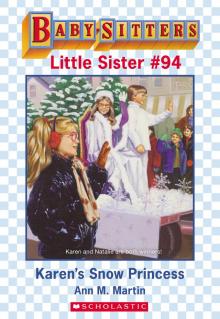 Karen's Snow Princess
Karen's Snow Princess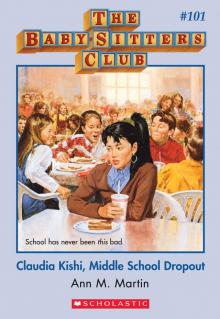 Claudia Kishi, Middle School Dropout
Claudia Kishi, Middle School Dropout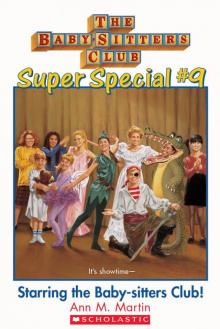 Starring the Baby-Sitters Club!
Starring the Baby-Sitters Club!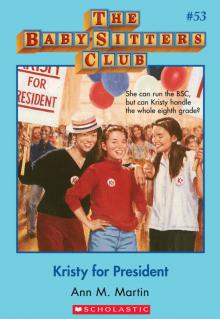 Kristy for President
Kristy for President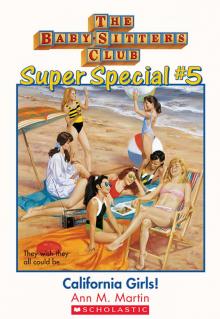 California Girls!
California Girls!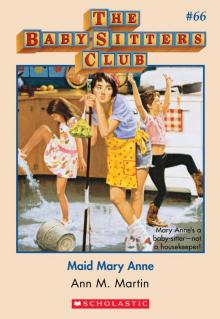 Maid Mary Anne
Maid Mary Anne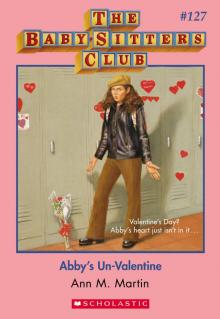 Abby's Un-Valentine
Abby's Un-Valentine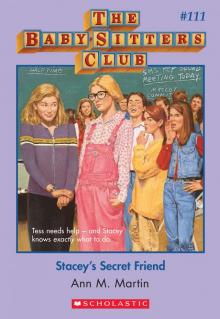 Stacey's Secret Friend
Stacey's Secret Friend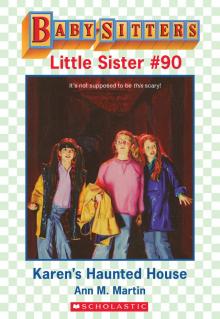 Karen's Haunted House
Karen's Haunted House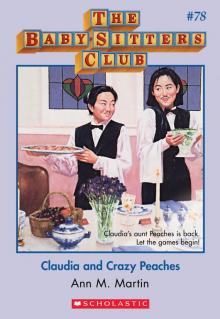 Claudia and Crazy Peaches
Claudia and Crazy Peaches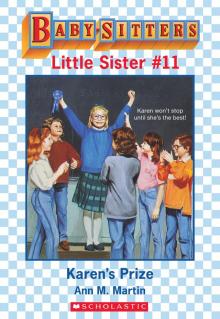 Karen's Prize
Karen's Prize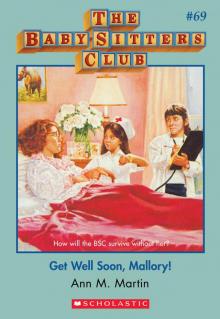 Get Well Soon, Mallory!
Get Well Soon, Mallory!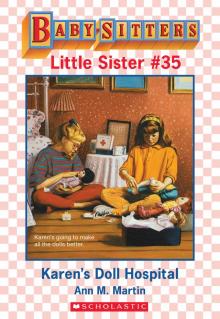 Karen's Doll Hospital
Karen's Doll Hospital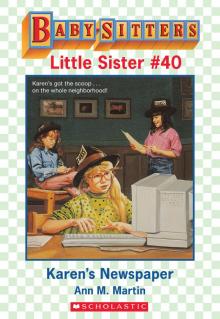 Karen's Newspaper
Karen's Newspaper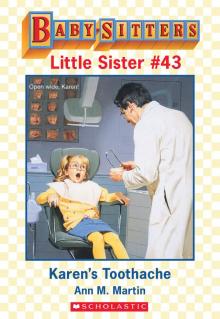 Karen's Toothache
Karen's Toothache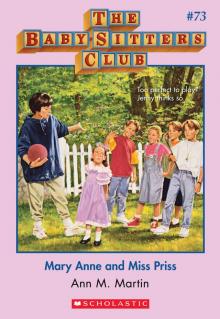 Mary Anne and Miss Priss
Mary Anne and Miss Priss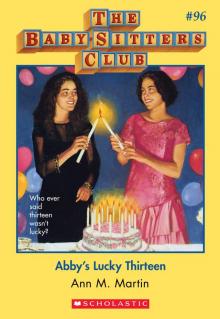 Abby's Lucky Thirteen
Abby's Lucky Thirteen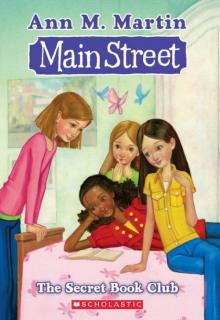 The Secret Book Club
The Secret Book Club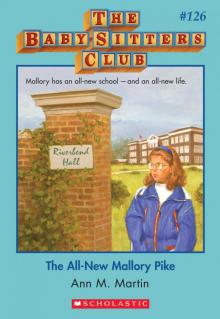 The All-New Mallory Pike
The All-New Mallory Pike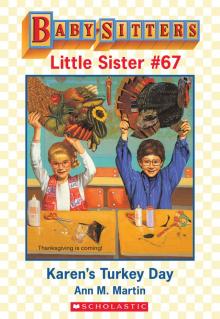 Karen's Turkey Day
Karen's Turkey Day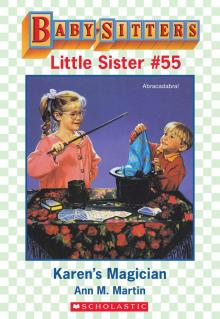 Karen's Magician
Karen's Magician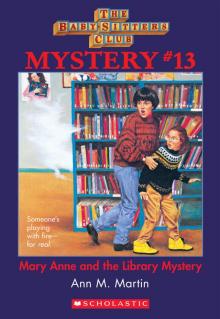 Mary Anne and the Library Mystery
Mary Anne and the Library Mystery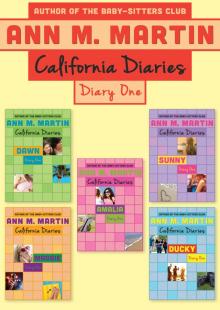 Diary One: Dawn, Sunny, Maggie, Amalia, and Ducky
Diary One: Dawn, Sunny, Maggie, Amalia, and Ducky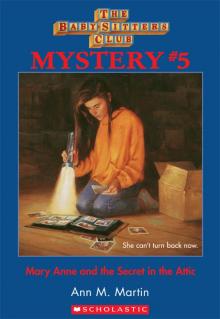 Mary Anne and the Secret in the Attic
Mary Anne and the Secret in the Attic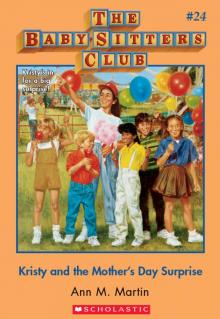 Kristy and the Mother's Day Surprise
Kristy and the Mother's Day Surprise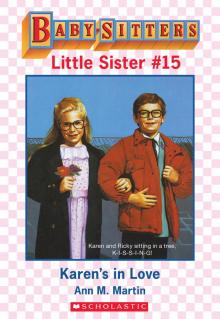 Karen's in Love
Karen's in Love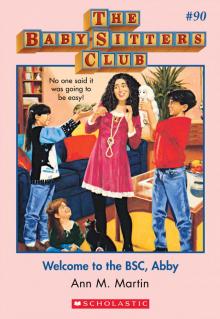 Welcome to the BSC, Abby
Welcome to the BSC, Abby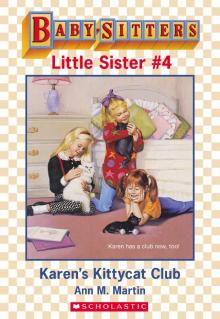 Karen's Kittycat Club
Karen's Kittycat Club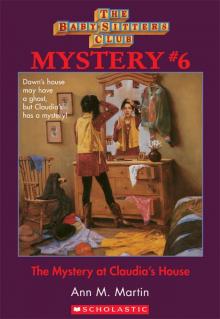 The Mystery at Claudia's House
The Mystery at Claudia's House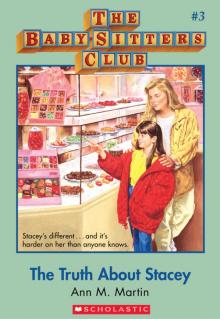 The Truth About Stacey
The Truth About Stacey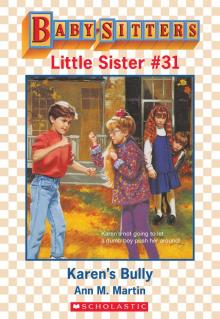 Karen's Bully
Karen's Bully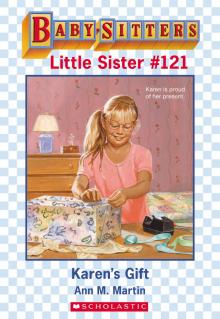 Karen's Gift
Karen's Gift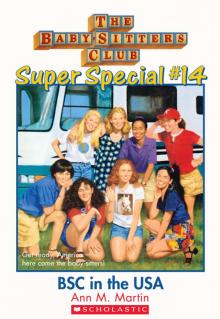 BSC in the USA
BSC in the USA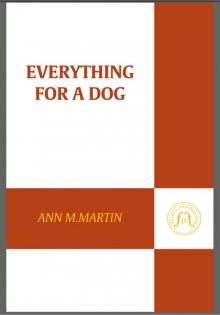 Everything for a Dog
Everything for a Dog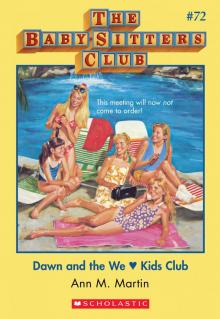 Dawn and the We Love Kids Club
Dawn and the We Love Kids Club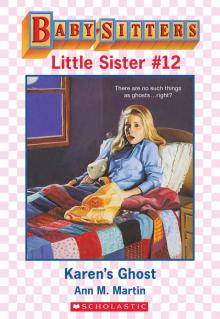 Karen's Ghost
Karen's Ghost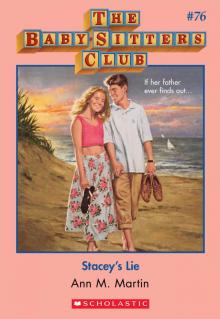 Stacey's Lie
Stacey's Lie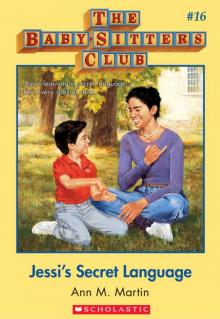 Jessi's Secret Language
Jessi's Secret Language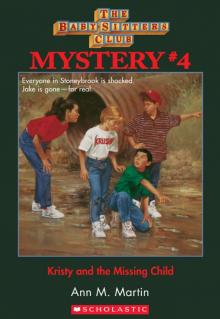 Kristy and the Missing Child
Kristy and the Missing Child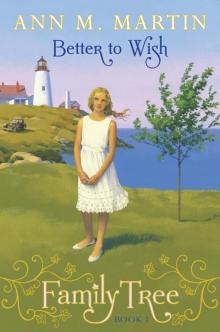 Better to Wish
Better to Wish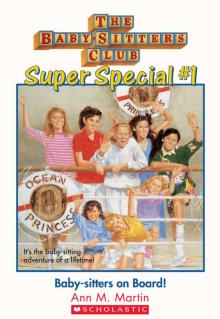 Baby-Sitters on Board!
Baby-Sitters on Board!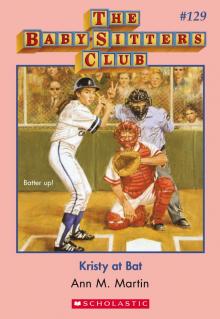 Kristy at Bat
Kristy at Bat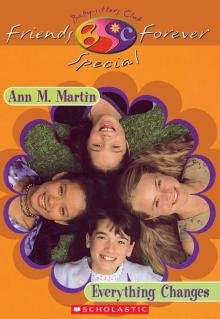 Everything Changes
Everything Changes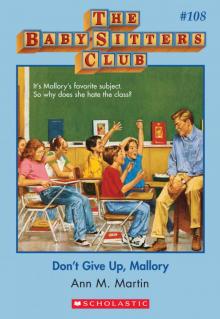 Don't Give Up, Mallory
Don't Give Up, Mallory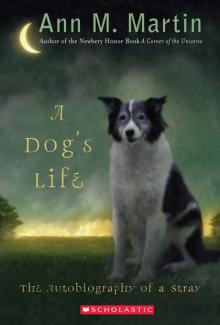 A Dog's Life: The Autobiography of a Stray
A Dog's Life: The Autobiography of a Stray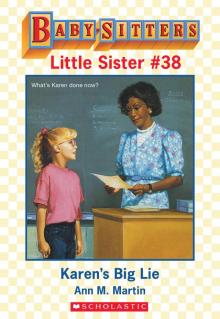 Karen's Big Lie
Karen's Big Lie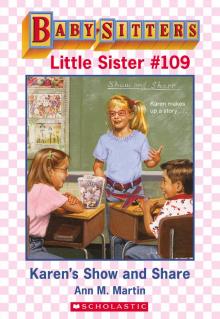 Karen's Show and Share
Karen's Show and Share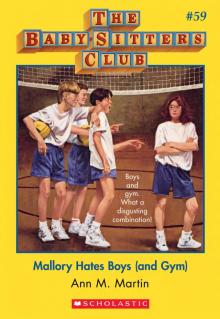 Mallory Hates Boys (and Gym)
Mallory Hates Boys (and Gym)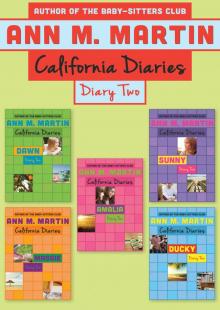 Diary Two: Dawn, Sunny, Maggie, Amalia, and Ducky
Diary Two: Dawn, Sunny, Maggie, Amalia, and Ducky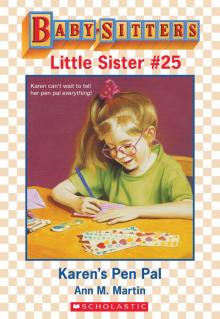 Karen's Pen Pal
Karen's Pen Pal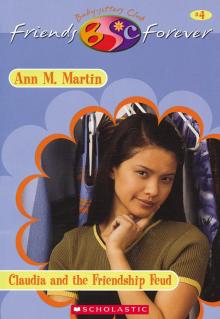 Claudia and the Friendship Feud
Claudia and the Friendship Feud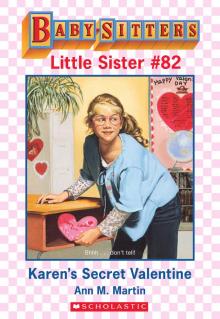 Karen's Secret Valentine
Karen's Secret Valentine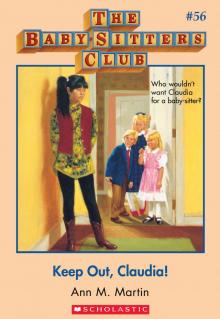 Keep Out, Claudia!
Keep Out, Claudia!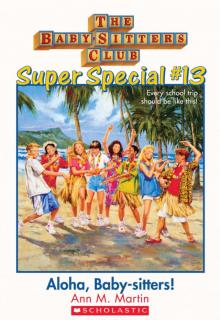 Aloha, Baby-Sitters!
Aloha, Baby-Sitters!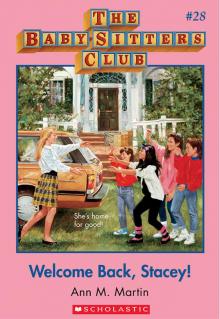 Welcome Back, Stacey
Welcome Back, Stacey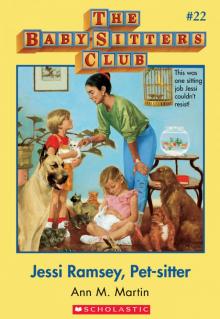 Jessi Ramsey, Pet-Sitter
Jessi Ramsey, Pet-Sitter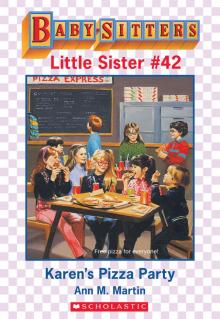 Karen's Pizza Party
Karen's Pizza Party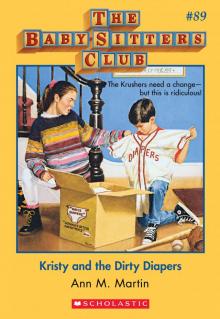 Kristy and the Dirty Diapers
Kristy and the Dirty Diapers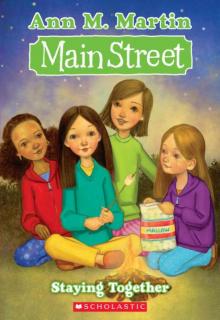 Staying Together
Staying Together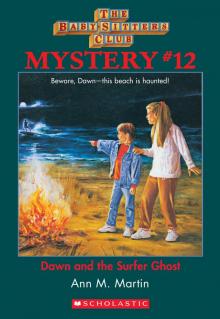 Dawn and the Surfer Ghost
Dawn and the Surfer Ghost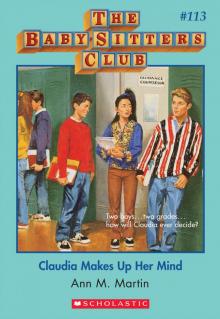 Claudia Makes Up Her Mind
Claudia Makes Up Her Mind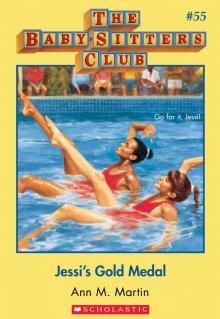 Jessi's Gold Medal
Jessi's Gold Medal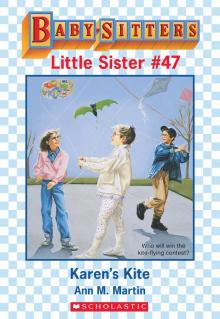 Karen's Kite
Karen's Kite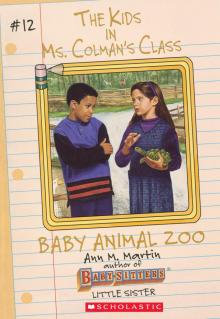 Baby Animal Zoo
Baby Animal Zoo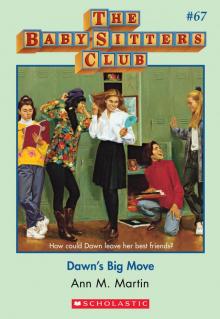 Dawn's Big Move
Dawn's Big Move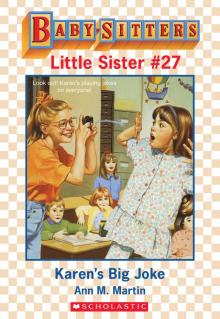 Karen's Big Joke
Karen's Big Joke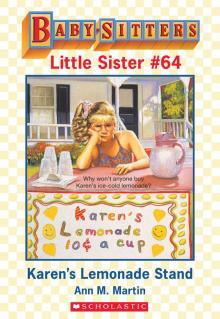 Karen's Lemonade Stand
Karen's Lemonade Stand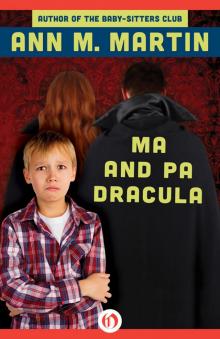 Ma and Pa Dracula
Ma and Pa Dracula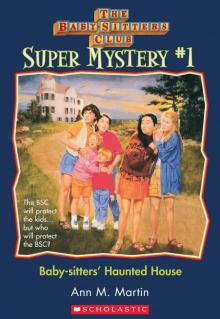 Baby-Sitters' Haunted House
Baby-Sitters' Haunted House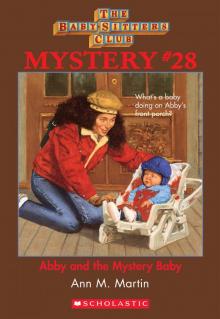 Abby and the Mystery Baby
Abby and the Mystery Baby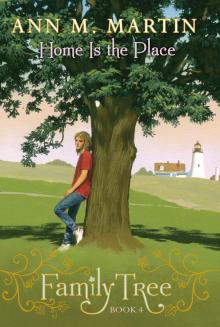 Home Is the Place
Home Is the Place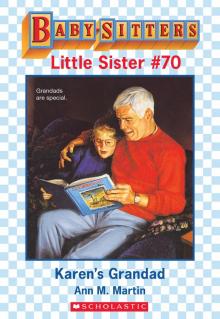 Karen's Grandad
Karen's Grandad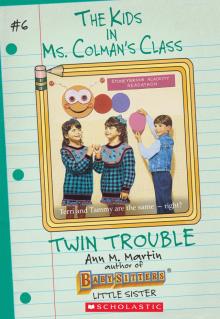 Twin Trouble
Twin Trouble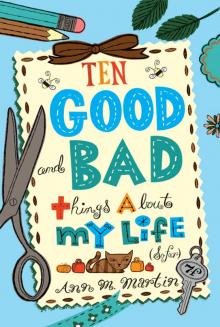 Ten Good and Bad Things About My Life (So Far)
Ten Good and Bad Things About My Life (So Far)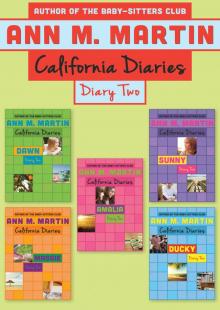 Diary Two
Diary Two Baby-Sitters Club 027
Baby-Sitters Club 027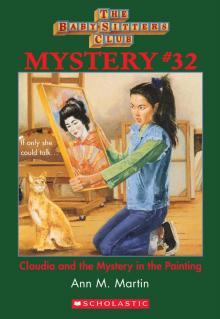 Claudia and the Mystery Painting
Claudia and the Mystery Painting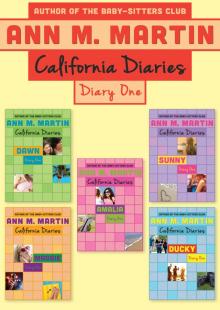 Diary One
Diary One Baby-Sitters Club 037
Baby-Sitters Club 037 Baby-Sitters Club 028
Baby-Sitters Club 028 Baby-Sitters Club 085
Baby-Sitters Club 085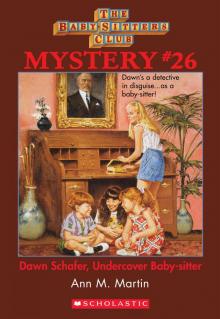 Dawn Schaffer Undercover Baby-Sitter
Dawn Schaffer Undercover Baby-Sitter Jessi's Babysitter
Jessi's Babysitter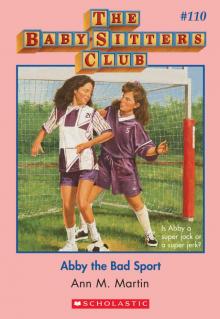 The Baby-Sitters Club #110: Abby the Bad Sport (Baby-Sitters Club, The)
The Baby-Sitters Club #110: Abby the Bad Sport (Baby-Sitters Club, The) Karen's Little Sister
Karen's Little Sister Baby-Sitters Club 058
Baby-Sitters Club 058 Claudia And The Genius On Elm St.
Claudia And The Genius On Elm St.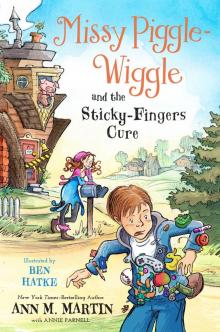 Missy Piggle-Wiggle and the Sticky-Fingers Cure
Missy Piggle-Wiggle and the Sticky-Fingers Cure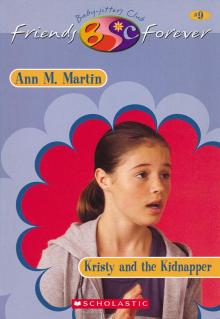 Kristy and Kidnapper
Kristy and Kidnapper Baby-Sitters Club 041
Baby-Sitters Club 041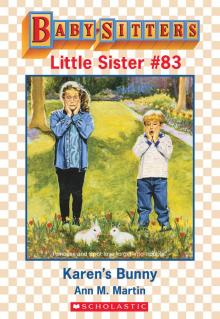 Karen's Bunny Trouble
Karen's Bunny Trouble Baby-Sitters Club 032
Baby-Sitters Club 032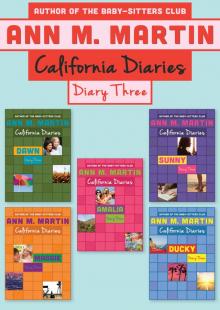 Diary Three
Diary Three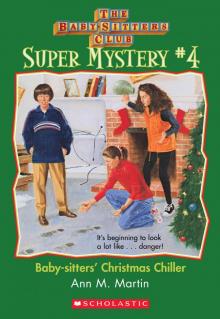 Christmas Chiller
Christmas Chiller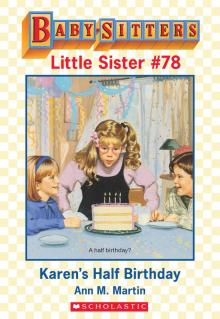 Karen's Half-Birthday
Karen's Half-Birthday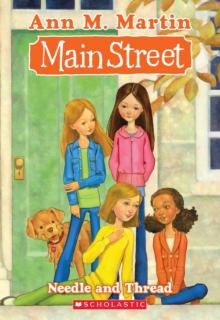 Needle and Thread
Needle and Thread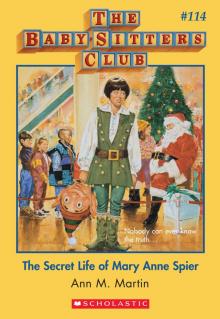 Secret Life of Mary Anne Spier
Secret Life of Mary Anne Spier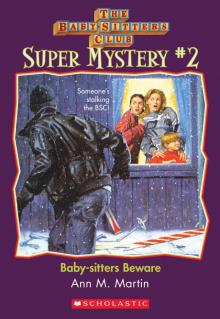 Baby-Sitters Beware
Baby-Sitters Beware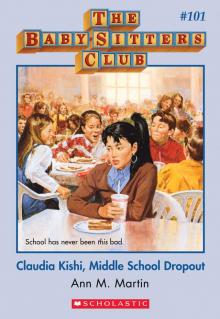 Claudia Kishi, Middle School Drop-Out
Claudia Kishi, Middle School Drop-Out Logan Likes Mary Anne !
Logan Likes Mary Anne ! Baby-Sitters Club 061
Baby-Sitters Club 061 Best Friends
Best Friends Baby-Sitters Club 031
Baby-Sitters Club 031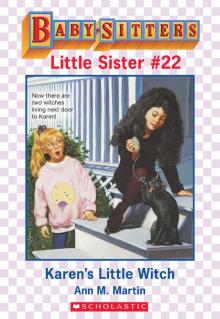 Karen's Little Witch
Karen's Little Witch Jessi Ramsey, Petsitter
Jessi Ramsey, Petsitter Baby-Sitters Club 123
Baby-Sitters Club 123 Baby-Sitters Club 059
Baby-Sitters Club 059 Baby-Sitters Club 033
Baby-Sitters Club 033 Baby-Sitters Club 060
Baby-Sitters Club 060 Baby-Sitters Club 094
Baby-Sitters Club 094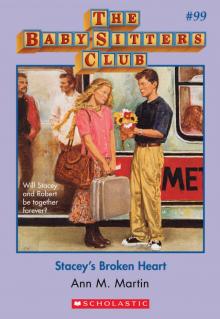 The Baby-Sitters Club #99: Stacey's Broken Heart
The Baby-Sitters Club #99: Stacey's Broken Heart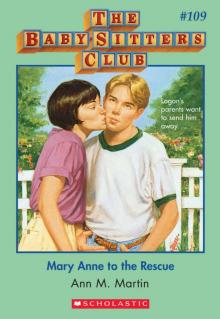 The Baby-Sitters Club #109: Mary Anne to the Rescue (Baby-Sitters Club, The)
The Baby-Sitters Club #109: Mary Anne to the Rescue (Baby-Sitters Club, The) Mystery At Claudia's House
Mystery At Claudia's House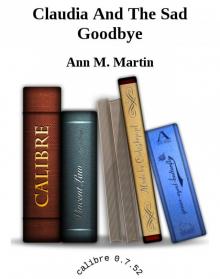 Claudia And The Sad Goodbye
Claudia And The Sad Goodbye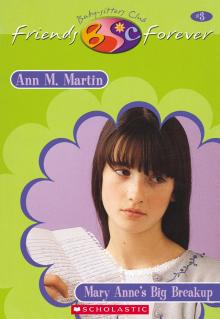 Mary Anne's Big Break-Up
Mary Anne's Big Break-Up Baby-Sitters Club 025
Baby-Sitters Club 025 Baby-Sitters Club 042
Baby-Sitters Club 042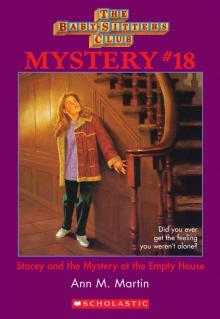 Stacey and the Mystery of the Empty House
Stacey and the Mystery of the Empty House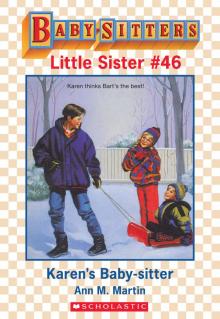 Karen's Baby-Sitter
Karen's Baby-Sitter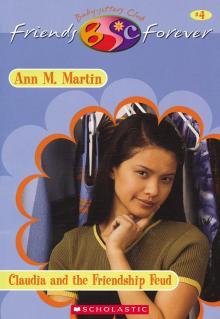 Claudia's Friendship Feud
Claudia's Friendship Feud Baby-Sitters Club 090
Baby-Sitters Club 090 Baby-Sitters Club 021
Baby-Sitters Club 021 Baby-Sitters Club 056
Baby-Sitters Club 056 Baby-Sitters Club 040
Baby-Sitters Club 040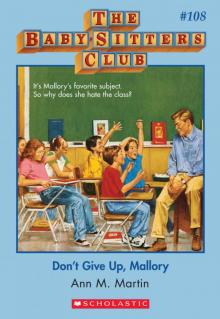 The Baby-Sitters Club #108: Don't Give Up, Mallory (Baby-Sitters Club, The)
The Baby-Sitters Club #108: Don't Give Up, Mallory (Baby-Sitters Club, The)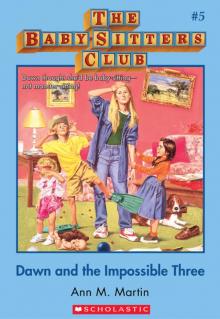 Dawn and the Impossible Three
Dawn and the Impossible Three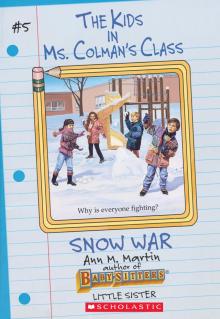 The Snow War
The Snow War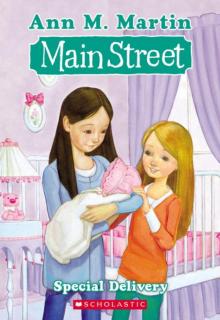 Special Delivery
Special Delivery Baby-Sitters Club 057
Baby-Sitters Club 057 Mary Anne And Too Many Babies
Mary Anne And Too Many Babies Baby-Sitters Club 030
Baby-Sitters Club 030